How Riverboat Gambling Became Riverboat Gaming
Kevin has been involved in the gambling industry since the ‘80s. From winning tournaments to casino management, he’s ultimately done it all. Throughout the years, he’s written for various iGaming publications on topics such as the legal landscape of online casinos and strategies behind winning. His favorite game is blackjack.
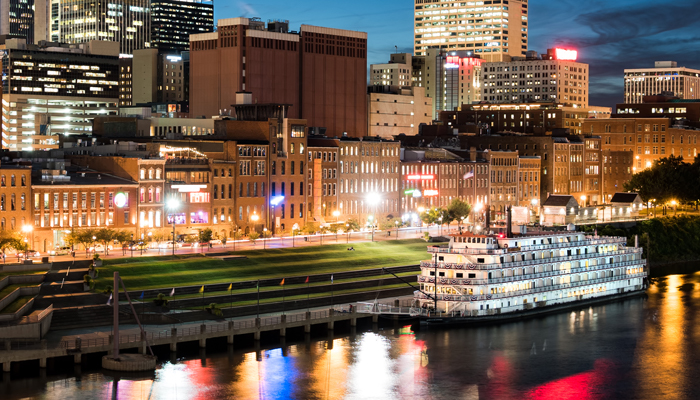
Cash-strapped states across the South and Midwest in the late eighties and early nineties were desperate for a new source of cash revenue that didn’t raise taxes. Gambling seemed like an easy way out, but it was going to be a hard sell to dubious voters.
But what if they used the allure of the old riverboat gambling myths and the promise of using the riverboat casinos to keep the gambling scourge at arm’s length from impacted communities? Could they sell this new, sanitized riverboat gaming to their constituents?

The Evolution of Gaming on America’s Rivers
We will explore the history of riverboat gaming in America from the early 19th century right into the 21st. We will discuss how it morphed and was delicately managed to become a product that a broad number of people could support a few decades ago, before starting another slow decline, and we take a closer look at some of its few bright remaining stars.
- ⛴ The History of Riverboat Gambling
- ⛴ The Beginnings of Riverboat Gaming
- ⛴ A Few of the Best Riverboat Casinos Remaining
- ⛴ Conclusion
The History of Riverboat Gambling
The first steamboat to make the trip down the Ohio and then the Mississippi was aptly named New Orleans, and she made her inaugural trip in 1811. For the next 100 years, these boats would define commerce along the nation’s mighty rivers. And with commerce comes con men.
The huge sums of money that came from moving much of the fledgling nation’s goods up and down the rivers would prove to be a powerful temptation. While much of the gambling that soon developed on these long, slow trips along the river was legal, many of the men who came to play were on the wrong side of the law .
Not even two decades into the new steamboat trade and there were articles in the Eastern papers about the con men, card sharps, and confidence scams being run on every bumpkin that set foot on a boat. In 1835, the townsfolk in Vicksburg had had enough; they lynched 5 of the “professional gamblers” and burned every Faro table in town, which was stated to be in the dozens.
Much like the frontiersman who preceded them and the Wild West lawmen who would come later, these sharply dressed, supremely confident riverboat gamblers who plied their way on the steamboats of the Mississippi using only their luck and some “skills” they’d picked up along the way were the subject of many salacious headlines and stories in their day. Despite their many obvious flaws, an almost reverence was bestowed on them as archetypical American heroes.
The Beginnings Of Riverboat Gaming
The hay day of the Riverboat gambler started to fade in the 1860s during the Civil War, and then with the advent of railroads, they were soon all but forgotten. But in the early 1990s, states desperate for tax revenue and looking at the success of Las Vegas and Atlantic City decided to retest the waters of riverboat gambling.
This time, it was a way of introducing limited casino operations only along the waterways of the State’s rivers, selling it to their constituents as a diversion and pastime. Thus, the term riverboat gaming was needed . This was to be entertainment and frivolity, none of those card sharps and hustlers from the good ole days. So, a new term was coined.
Iowa led the riverboat race with the Diamond Lady in Bettendorf in April 1991. But riverboat gaming would soon come to Illinois, Mississippi, Missouri, Louisiana , and other states along the Mississippi and other large rivers like the Missouri and Ohio and even the Fox and Red Rivers.
Used mainly as a stalking horse for the eventual opening of land-based casinos in most of these states, many gamblers found the cramped quarters, the limited selection of slots and tables, and most egregious of all, the ability to only embark or disembark while the boat was at the pier, to be a let down from the Las Vegas style experience that they had been promised.
In Iowa, the first land-based casinos made an appearance in just three years. In every State, some accommodations were made , from no longer having to cruise the dangerous rivers to being allowed to move on to barges over the river to being able to move to land as long as you were adjacent to the river. This was a push generally called dock-side gaming, which meant that the actual return of elegant paddle wheelers with blackjack, roulette, and slot machines prowling the Mississippi again lasted less than a decade.
Dock-side gaming was far safer and allowed gamblers to come and go as they pleased , which drove casino revenues much higher. Also, the ability in some states to move either onto barges or land-based casinos adjacent to piers saw some spectacular casinos get built that could finally meet the promise of a Las Vegas experience.
A Few Of The Best Riverboat Casinos Remaining
If you are going to visit one of the grand old ladies of the river, we think that you should start with the actual riverboats that once traveled the Mississippi, and of these, the Amelia Belle is one of the most iconic .
Situated about an hour and a half outside New Orleans, deep in Cajun Country, this beautiful riverboat gambling hall has over 30,000 square feet of gaming space , 800 slots, and a dozen table games. Before she was damaged during Hurricane Katrina, she sailed up the river from the port of New Orleans several times a day in the mid-90s, but she now sits permanently in Bayou Bouef, her expedition days behind her.
Since Louisiana has kept its premise of at least gambling on a boat, even if its moored in a giant pool or cemented to the dock, longer than most other of the original riverboat casino states, it’s no wonder we can find most of the truly breathtaking and best riverboat casinos there.
Another of the must-see gambling boats sits on the Red River in Shreveport, Louisiana. Chosen for its 20-minute proximity to the Texas border and only two and a half hours drive from Dallas, Shreveport was once a thriving riverboat gambling town and one of the country’s premier riverboat casino locations. But the Indian tribes in Oklahoma, which sit only an hour outside of Dallas to the North, have taken some of their business.
Still, there are several other riverboats operating in Shreveport, but what we think makes the Sam’s Town Property, one of the best riverboat casinos in Louisiana , is that they’ve turned a 30,000-square-foot gaming boat into a destination resort. They have a 500+ room hotel directly adjacent and tied into the property with four restaurants including a really nice steak house and lots of other amenities. The boat itself has over 1000 slots and more than 27 table games.
One of the best riverboat casinos outside of Louisiana is the Grand Victoria in Elgin, Illinois. Built back in 1995, she was spared the dangers of cruising the Fox River in 1999, when Illinois was one of the last states to end their riverboat gaming rules that required the boats to leave their docks. Today, this 30,000-foot boat has room for 1100 slots and almost 30 tables and even sports an onboard buffet and three other restaurants. She is one of the prettier examples of the early 1990s boats that you will see as well, and it is well worth your time to get a good vantage point and take in her lines.
While both the age of riverboat gamblers and its more recent short-lived renaissance of riverboat gaming are now a thing of the past, the allure of cruising the mighty Mississippi while making your living playing cards and shooting dice will probably live on into the distant future. There is something about the water flowing past and the land slipping by out the window that just seems to call for a quick hand of poker or a spin on the roulette wheel.
It’s a call back to a time when the men and women who traveled these waterways were used to risking everything in order to follow their dreams. Get out there and check out some of those boats, wander the decks, play a hand or two of blackjack, and contemplate that river streaming by while you still have a chance to see a dying American breed , the last of the riverboat casinos.

- Terms & Conditions
- Golden Nugget
- Online Slots
- Online Baccarat
- Online Blackjack
- Online Roulette
- Casino Guides
- Destinations
The Legacy and Historical Influence of Riverboat Casinos in the United States

Welcome aboard as we set sail into the captivating world of riverboat casinos in the United States . On this page, we’ll walk you through their legal status and historical implications, explore the where, what, and why of these floating gaming venues, and finally, take a close look at the modern condition of riverboat gambling.
As we explore the ins and outs of this unique chapter in American gaming history, we’ll also take a glance at if riverboat casinos have left a mark on the WV online gambling scene and gambling in the US in general.
- Legal Status of Riverboat Gambling
- Boat Casinos Regulation in Various States
- History of Riverboat Gambling
- Popular Riverboat Casinos
The Legal Status of Riverboat Gambling
Historically, casino boats were allowed in many states, mostly those with access to the Mississippi River. Today, only six states still allow this form of gambling:
Mississippi
Gambling boats are essentially floating casinos operating on designated waterways . They offer a wide variety of gambling activities just like land-based casinos, including slots , table games , and poker .
Each state with legal riverboat gambling has its own regulatory body responsible for licensing and ensuring compliance with state laws and regulations. These regulations typically address aspects such as gambling activities allowed, revenue sharing with the state, security measures, responsible gambling practices, and environmental considerations.
While sharing similarities with land-based casinos, riverboat casinos face additional regulations due to their unique setting, such as:
- Licensing requirements . Land-based casinos typically have more stringent licensing requirements than riverboat casinos. For instance, land-based casinos may be required to undergo a more rigorous background check and financial audit process compared to riverboat casinos;
- Location restrictions . There are usually fewer restrictions on riverboat casino locations than on those of the brick-and-mortar venues. For instance, land-based casinos might not be allowed to operate in certain areas, such as residential neighborhoods or near schools. Riverboat casinos, in turn, are more flexible when it comes to location, as they can be moored on rivers that flow through various areas;
- Taxation . The taxation of land-based casinos and riverboat casinos can vary depending on the state. In some cases, land-based casinos may be subject to higher tax rates than riverboat casinos;
- Building codes . Land-based casinos are typically required to meet more stringent building codes than riverboat casinos. This is because land-based casinos are permanent structures, while riverboat casinos are considered temporary structures;
- Inspection and enforcement . Land-based casinos usually undergo more frequent inspections and stricter enforcement of regulations compared to riverboat casinos.
Generally, the regulation of land-based casinos tends to be more strict and comprehensive than the regulation of any casino on the Mississippi River . The reason is likely that land-based casinos are considered to have a greater impact on the surrounding community , both in terms of economic benefits and social costs.
State-by-State Riverboat Gambling Regulations
As of 2024, it’s legal to run and visit a riverboat casino in six states. Let’s take a closer look at each of them:
Here, riverboat casinos are allowed on the Mississippi River , the Illinois River , and the Des Plaines River . The casinos must be located at least 300 feet from the shore and be accessible to the public by land or water . Riverboat casinos in Illinois are regulated by the Illinois Gaming Board .
In Indiana, boat casinos can operate on the Ohio River , the Indiana Harbor , and the Patoka Lake Reservoir . They must be located at least 600 feet from the shore . Riverboat casinos in Indiana are regulated by the Indiana Gaming Commission .
In this state, it’s legal for riverboat casinos to operate on the Mississippi River and the Missouri River . They must be located at least 300 feet from the shore and are regulated by the Iowa Racing and Gaming Commission .
A riverboat casino in Louisiana is allowed to operate on the Mississippi River , the Red River , and the Gulf of Mexico as long as they are located at least 300 feet from the shore . The casinos here are regulated by the Louisiana Gaming Control Board .
Obviously, a riverboat casino in Mississippi can be located on the Mississippi River at least 300 feet from the shore . Boat casinos in Mississippi are regulated by the Mississippi Gaming Commission .
Last but not least, Missouri riverboat casinos are allowed on the Mississippi River and the Missouri River at least 300 feet from the shore . Riverboat casinos in Missouri are regulated by the Missouri Gaming Commission .
Brief History of Riverboat Casinos
Explore the history of riverboat casinos in the United States, tracing their origins, development, and impact on both the gambling industry and American culture.
19th Century: The Origins of Riverboat Gambling
The roots of riverboat gambling can be traced back to the 19th century when steamboats were the primary mode of transportation along the Mississippi River. As passengers went on long journeys, gambling became a popular pastime to pass the time. While gambling activities were generally illegal on land at that time, boats provided a loophole, as they were considered to be outside of state jurisdiction.
Early 20th Century: Decline and Revival
The invention of railroads in the early 20th century led to a logical decline in riverboat travel, and respectively, riverboat gambling. However, the 1970s saw a reappearance of interest in riverboat casinos, primarily because of the push to revitalize urban areas.
1990s: Expansion and Legalization
The 1990s marked a period of significant growth for riverboat casinos. Several states legalized riverboat gambling, and the industry expanded rapidly. By the late 1990s, there were over 150 riverboat casinos operating in the United States.
2005: Hurricane Katrina and Its Devastating Blow
In August 2005, Hurricane Katrina struck the Gulf Coast, causing widespread destruction and displacement. The storm severely impacted the boat casino industry in Mississippi and Louisiana, with several casinos suffering significant damage or complete destruction.
Late 2010s: Post-Katrina Recovery and Adaptation
The consequences of Hurricane Katrina brought significant changes to the riverboat casino industry. While some casinos managed to rebuild and reopen, others had to close permanently. The industry also faced increased competition from brick-and-mortar casinos, which were gaining popularity at that time.
Today: A Mature Industry
Today, a casino boat remains a popular form of entertainment in the United States. However, the industry has matured and consolidated, with the number of riverboat casinos decreasing in recent years. Despite these changes, riverboat casinos continue to be an important economic driver in many regions.
Popular Riverboat Casinos in the US
Now that we know all the theory about riverboat gambling, let’s get to practice and take a look at the most popular water casinos in the United States.
The Grand Victoria Casino – Elgin, Illinois
Located along the beautiful Fox River, The Grand Victoria Casino is a home (or rather a boat) of true gaming elegance. Known as the largest riverboat casino in Illinois, it boasts an impressive 65,000 square feet of gaming space including slots, table games, and a poker room. The casino also offers a variety of dining and entertainment options, including a steakhouse, a buffet, and a concert venue.
Ameristar Casino Vicksburg – Vicksburg, Mississippi
The Ameristar Casino Vicksburg is one of the oldest and most crowded riverboat casinos in Mississippi with over 50,000 square feet of gaming space . The wide choice of slots, table games, and poker tables is complemented by all kinds of entertainments, from the flavors of a diverse buffet to comedy clubs and nightclubs.
Horseshoe Casino – Bossier City, Louisiana
The Horseshoe Casino is one of the largest riverboat casinos in Louisiana and one of the most popular. It features over 100,000 square feet of gaming space , including slots, table games, and a poker room. The casino also offers a variety of dining and entertainment options, so players can choose between a steakhouse, a buffet, a concert venue, and others.
Sam’s Town Casino – Shreveport, Louisiana
Sam’s Town Casino is a popular destination for all kinds of gaming enthusiasts in and out of state. With a gaming space of over 34,000 square feet , this casino offers an intimate yet exhilarating experience. Beyond the slots, table games, and poker room, Sam’s Town welcomes gamers to savor a culinary journey with a steakhouse, a buffet, and a unique entertainment experience at the in-house bowling alley.
What is the Diamond Lady casino boat?
The Diamond Lady Riverboat Casino was a paddlewheel riverboat casino that operated on the Mississippi River in Bettendorf, Iowa, from 1991 to 2008. In 2021, the Diamond Lady sank during a severe winter storm. It was later raised and brought to shore, where it remains today. The future of the Diamond Lady is uncertain, but it is possible that it will be restored and reopened as a casino or museum.
Why do casinos have to be on water in the US?
Casinos in the US don’t necessarily have to be on the water, but there are some casinos that are. This practice originated when gambling laws were more restrictive on land, and the association of riverboat gambling with waterborne transportation became a legal requirement in some states.
Why are casinos on the water so popular?
Riverboat casinos are popular for their unique charm and historical allure. The on-water setting offers players a distinctive and memorable gaming experience, contributing to the popularity of these establishments. Additionally, the regulations associated with riverboat gambling create a controlled and regulated environment that appeals to both operators and players.
Most Recent

Join our subscription list to get access to new bonus offers, online casino reviews, and industry news all in one newsletter!

History of Riverboat Gambling on the Mississippi
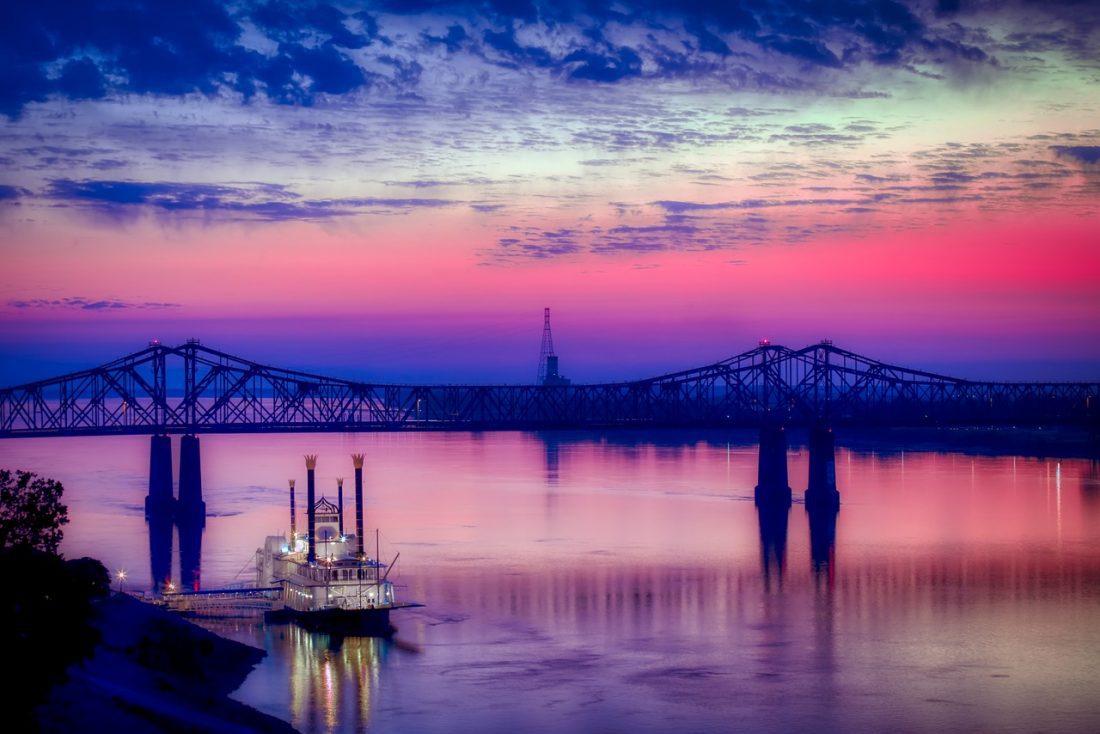
The South has always been at least somewhat friendly to gambling due to the rise of the riverboat in the early 1900s. Games of chance were kept on the water so that anti-gambling laws wouldn’t apply. Games like poker and roulette took place on grand riverboats, even if the ship never left the dock.
This tradition was greatly reduced when the railroad became the main way to transport both goods and people, but some riverboats remain in the South today. In Mississippi and Louisiana, especially, retired steamboats are now used for river cruising and for gambling in places like Vicksburg.
Online casinos are one of the latest innovations in the casino industry. Since the rise of technological advancements, they are solid competitors to U.S.-based land-based casinos. Many gambling restrictions still remain in the South and across the ocean. For example, every casino in the UK gets licensed by the UK Gambling Commission.
The regulations of the U.S. online casino market have led to developers existing who only get associated with U.S. casinos and are not available at UK-based gaming sites. Some famous developers for the U.S. market are RealTime Gaming, Relax Gaming, Rival Gaming, Elk Studios and Betsoft.
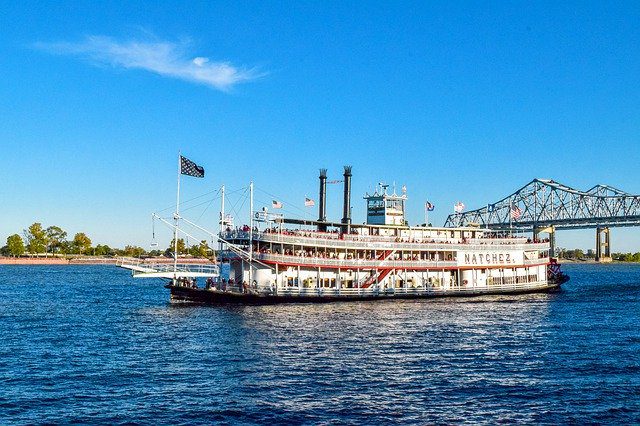
But for those players who want the old-time experience of dressing up and boarding a grand steamboat, the South has plenty for them. Just look along the Mississippi River from Missouri to Louisiana. According to Visit Mississippi , the first steamboat to travel the Mississippi River was the New Orleans, whose October 1811 maiden voyage began in Pittsburgh, Pennsylvania. The New Orleans stopped in Natchez in December 1811 before continuing to its final port in New Orleans.
Wealthy Southerners could afford to travel by steamboat, and some were ornately decorated in the Victorian style. The riverboat casinos that remain today continue that grand tradition, with music playing onboard, restaurants available to players and even live entertainment offered regularly.
So, if you want to step back in time and experience the old South by river—without all the outlaws and pirates —consider a riverboat cruise or evening of gaming.
SHARE THIS STORY:
Eco-conscious travel, the wild history of, related articles.

3 Must-Visit Histori

6 Creative Trips Thr

Best Photo Spots in
No comments, leave a comment cancel reply.
- CRUISE TIPS
- Carnival Cruise Line
- Celebrity Cruise Line
- Disney Cruise Line
- Holland America Line
- MSC Cruises
- Norwegian Cruise Line
- Princess Cruises
- Royal Caribbean
- Virgin Voyages
- Windstar Cruises
- Travel Deals
- CRUISE SHIP TRACKER
- Port Webcams

There are various areas of the world that just seem synonymous with gambling. When people hear the name Las Vegas they picture gambling of a flashy, mass entertainment proportion. Macau ’ s gambling culture brings a real Asian flavour to gambling, with many inevitably comparing it to Vegas. Monte Carlo delivers gambling connotations of wealth and prestige. Obviously, it is not just physical areas where gambling has a strong presence, with the web and mobile space being dominated by PartyCasino and other big names in the industry.
Another, yet somewhat less spectacular, sight that can only be associated with gambling is the steam propelled riverboat of certain states in the USA. How did these iconic vessels come to be known for hosting casinos, and what is the current status of riverboat casinos today?
On Water, But Not Land
There is a network of rivers that penetrate inland from the Gulf of Mexico up through the United States, most famously the Mississippi River . In the 19 th Century the rivers provided a fantastic way to transport goods from town to town up and down the bodies of water. This in turn became a popular method of passenger transport, with travellers using the boat to socialise. One of the most popular forms of entertainment was play at online Irish casino , and therefore this pastime became highly popular aboard the vessels.
There were also, and still are today, laws that prohibited gambling on land. However, the proprietor s of these boats took advantage of the loophole not extending these laws to establishments on water. Even today, riverboats are still to be found on the Mississippi and is still considered one of the best for cruises. Certain rivers acted as state lines, so it was sometimes argued that the gamblers could not be classified as being in one state or another while steaming down a river.
Railroads and War
As mentioned, the riverboats were first and foremost a means of transportation and enjoyed such success due to it being the quickest and most reliable means of travel and delivery of goods. However, when railroads started to spread across the country, they opened up new routes that got people around in a more direct manner. The trains also cut days off travel and therefore started to overtake the riverboats in popularity.
Around the same time the American Civil War broke out, a period where much of the fighting was done in the Southern States which defied the laws laid out by the North. This meant that riverboat entertainment almost came to a complete end.
The Riverboats of Today

Unlike the boats of old, which used to set off on long journeys to various destinations, the vessels of now mostly remain docked and very seldom actually take to the open waters. However, one will still be able to undergo the traditional experience that thousands enjoyed before casinos became what we are familiar with today.

- #RiverCruise

Related Articles
What to see in lisbon in one day when you get off the cruise ship, how to explore new cities with your loved ones on a budget, maximize your cruise experience: top tips for an unforgettable holiday, get the cruise addicts newsletter free.
Stay in the loop with the latest cruise news, tips, and reviews directly to your inbox.
Latest Articles
How to prepare for your first cruise, upside down pineapple meaning on a cruise ship.
© Copyright 2024 - Cruise Addicts
- Affiliate Disclaimer
- Privacy Policy
A Guide To The Most Iconic Riverboat Casinos In The US
- MEET THE TEAM
- PRIVACY POLICY
- TERMS OF USE

Talk about casino destinations and you’ll most likely think of Las Vegas, Atlantic City or, if you are travelling outside the US, maybe Monaco or Macau.

Yet what are called “land based” or “bricks and mortar” casinos to differentiate them from the online versions are not necessarily on land or made of bricks and mortar.” To: “Yet what are called “land based” or “bricks and mortar” casinos to differentiate them from the online versions like 1xbet India online casino, are not necessarily on land or made of bricks and mortar.
We refer, of course, to riverboat casinos, a little slice of Americana that’s as American as Super Bowl Sunday or Thanksgiving turkey. Riverboat casinos conjure up images of the Mississippi and Mark Twain complete with white suit, top hat and cigar. There are more than 60 riverboat casinos operating in the USA and every single one of them has a story to tell. Here, we highlight a handful of the very best.
The Grand Victoria, Elgin
Our first stop is not on the Mississippi at all, but on the Fox River in Elgin, 50 miles north west of Chicago . Owned and operated by Caesars Entertainment, the Grand Victoria really is a slice of Las Vegas on the Illinois waterfront. With more than 1,000 slots and video poker terminals and 36 tables, there’s a great choice of games.
If all that gambling whets your appetite, there are four dining options on board, including the highly rated Buckingham’s Steakhouse and Lounge.
Casino Queen, Marquette
The Casino Queen would look like a lifeboat if it was moored alongside the Grand Victoria, but that is all part of its charm. It offers a more intimate and personalized experience, and although there are only eight tables, they host an intriguing variety of games that are not commonly found in land (or water) based casinos. If you know how to gamble online in the US , you’ve probably seen fusion blackjack and 21+3 at US online casinos. The Casino Queen gives you an opportunity to play them in real casino surroundings.
When you step ashore, there is an adjacent 31-acre entertainment complex with a variety of attractions and a huge choice of dining options.
The Amelia Belle, Amelia
At last, we arrive in Louisiana, where the Amelia Belle lies nestled in the Avoca Island Cutoff waterway. This classic four-story riverboat looks like it has stepped straight out of a photograph from the turn of the 20 th century. When it is lit up at night, it takes your breath away.
At the tables, poker is the order of the day. The casino offers Mississippi stud, 3-card poker and Texas Holdem. There are also 800 slot games, while the Fanduel sportsbook has self-service betting kiosks, a wall full of television screens, and a huge video wall to show the biggest events.
Sam’s Town, Shreveport
On the opposite side of Louisiana, Sam’s Town could not be more different to the Amelia Belle. This floating leisure complex houses a hotel, health spa, sauna and live entertainment venue.
The casino offers more than 1,000 slots and 30 table games that include blackjack, roulette, baccarat, Let it Ride and Craps No More.
Team JST work with our sponsors, shop vendors, and many more to create informative and engaging content.
Jetset Times in your inbox
By signing up, you agree to our Privacy Policy and European users agree to the data transfer policy.

Travelling With Exciting Casino Experiences

Discover Entertainment While Taking The Road

5 Top Tips To Elevate Your Casino Experience

From Vegas To Monte Carlo: Iconic Destinations For Gambling Enthusiasts

Night Rhythm: Exploring Nightlife Culture In The World’s Capitals

The most comprehensive and authoritative history site on the Internet.
Gambling in the Old West
As towns sprouted in the 19th-century American West — outside Army forts, at river crossings along wagon trails, in mining districts and at railheads — some of the first structures built were recreational facilities. Recreation for the almost totally male population inevitably meant the triple-W vices of the frontier: whiskey-drinking, whoring and wagering.
Saloons, brothels and gambling halls would appear almost overnight. In the early camps, the structure might be only a lantern-lit, dirt-floored tent, the bar simply a board stretched between two whiskey barrels, the prostitution facility just a cot in a wagon bed for the use of a single female strumpet, and the gambling outfit only a rickety table, a few chairs and a greasy, dog-eared deck of cards. As the towns grew and prospered, these primitive facilities were replaced by one-story wooden buildings with false fronts to make them appear even larger. And if the community developed into a city, saloons were housed in imposing brick buildings with ornate bars, huge back-bar mirrors and brilliant chandeliers. Some brothels became elegantly furnished parlor houses with attractive ‘boarders’ managed by madams whose names were famous throughout the West. The best-known sporting men of the West presided over and patronized gambling houses that were often the most impressive and elaborately accoutered structures of the cities.
The popularity of gambling in the West can be attributed mostly to the fact that all who left the relative safety and comfort of the East to seek fame and fortune on the frontier were, in a sense, natural-born gamblers. In the early West, gambling was considered a profession, as legitimate a calling as the clergy, the law or medicine.
During the 25-year period prior to the Civil War, gambling flourished in the towns along the Mississippi from New Orleans to St. Louis and was a staple attraction on virtually every riverboat. This golden age of gambling produced some of the most memorable practitioners of the art — legendary professionals like Charles Cora, J.J. Bryant, Jimmy Fitzgerald, John Powell, Charles Starr and Napoleon Bonaparte ‘Poley’ White.
One of the popular gambling games of the 19th century was a bluffing game that evolved into American poker. Another, vingt-et-un (twenty-one), introduced into the United States through the predominately French community of New Orleans, we now call blackjack. Still another was Mexican monte. But undoubtedly the most popular gambling game in the West was faro, which drew its name from the Egyptian pharaohs depicted on the back of the cards.
The foremost faro player on the Mississippi was Italian immigrant Charles Cora. After winning $85,000 and breaking several faro banks in New Orleans, Vicksburg and Natchez during one six-month period, he was banned from many resorts. J.J. Bryant, perhaps the best-known professional gambler on the lower Mississippi, lost thousands to Cora.
Jimmy Fitzgerald and Charles Starr were early standard-setters of the sartorial splendor that became a hallmark of the 600 to 800 professional gamblers plying their trade on the river. Their expensive black suits and boots were offset by snow-white ruffled shirts and dazzling brocaded vests. Ostentatious jewelry advertised the gambler’s prosperity. Huge rings adorned his fingers. A stickpin with a large stone, called a ‘headlight,’ sparkled on his chest. In a pocket of his ‘flowerbed’ vest was an enormous pocket watch adorned with precious jewels and attached to a heavy golden chain that draped across the gambler’s chest.
The discovery of gold in California and the resulting rush of 1849 attracted many of the paddle-wheel and Mississippi River town gamblers to San Francisco, the new El Dorado of the West. By the early 1850s Portsmouth Square, the center of the City by the Bay, was ringed by large gambling houses where the doors never closed and enormous sums changed hands over the tables.
There was the Parker House, originally built by its owner, Robert A. Parker, as a hotel, but quickly converted to a casino as the gambling craze swept San Francisco. A large room downstairs contained three tables for faro, two for monte, one for roulette and a seventh for any other game desired. Professional gamblers paid $10,000 a month for the privilege of conducting their games in this room. A smaller room behind the bar went for $3,500 a month. Jack Gamble, an appropriately named sporting man, leased the entire second floor for $60,000 and outfitted all the rooms for games of chance. It was estimated that at the peak of the California Gold Rush upward of half a million dollars was stacked on the tables of the Parker House on any given day.
Flanking the Parker House on either side were two other famous resorts, Samuel Dennison’s Exchange and the El Dorado Gambling Saloon, owned by partners James McCabe and Thomas J.A. Chambers. Other houses on Portsmouth Square were the Verandah, the Aguila de Oro, the Bella Union, the Empire, the Arcade, the Varsouvienne, the Mazourka, the Ward House, the St. Charles, the Alhambra, La Souciedad, the Fontine House and the Rendezvous. As indicated by the several French names, some of these establishments were owned and operated by gambling syndicates from France, a country long known for its love of gaming.
As mining camps sprang up and grew in the hills surrounding San Francisco, the gamblers followed. Soon elaborate temples devoted to the goddess Chance were running day and night in Sacramento, Columbia, Nevada City and other Sierra boom towns.Among the former Mississippi riverboat gamblers who gained prominence on the California scene were Cora and Bryant. In San Francisco Cora continued to enjoy remarkable success at the faro tables, but luck completely deserted him after he resolved a difficulty with U.S. Marshal William H. Richardson on November 18, 1855, by shooting him to death on a San Francisco street. Shootings and stabbings were common occurrences in the city, and had this murder been committed a few months earlier Cora might have escaped punishment on the ancient claim of self-defense. But violence had reached such proportions in the city that residents were calling for reorganization of the Vigilance Committee that had been so effective against the criminal element in 1851. In that year vigilantes had executed or banished from the city many miscreants, and now, five years later, they felt another no-nonsense cleansing was called for. They tried Cora, found him guilty and on May 22, 1856, hanged him from the roof of their headquarters building.
Bryant’s California fortunes were better. After his arrival, he had purchased the Ward House, refurbished and renamed it the Bryant House, and soon became one of the most prosperous and influential men in San Francisco. In 1850, when the first election for sheriff was held in the city, he ran for the office. Although he spent $50,000 on his campaign and bet another $10,000 that he would win, he was defeated by the popular Jack Hays, a celebrated former Texas Ranger. Bryant sold his gambling house and moved on to the outlying camps, where he was financially successful. By the time he left California in 1854, he had reportedly sent $110,000 in winnings to his wife while maintaining a lavish lifestyle for himself. He resumed his gambling operations in the South and continued to prosper, but at the end of the Civil War he found himself destitute, as his wealth was in worthless Confederate currency. He was reduced to ‘roping suckers’ into a sharper’s crooked game. One of the suckers took offense and in 1868 shot him dead.
With the 1860s came the great mining excitement of the fabled Comstock Lode in Nevada. Most of the gambling activity in the Comstock was centered in Virginia City and nearby satellite communities. As in San Francisco, gambling houses dominated the main streets of the new towns. At the height of the boom an agent of the U.S. Geological Survey, studying recreational opportunities in Virginia City, found that the town of 18,000 had a gambling house for every 150 inhabitants. The best known of the many resorts in Virginia City was the Gentry and Crittenden Gambling Saloon, which featured a no-limit faro table presided over by the famous dealer Hamilton Baker. Other houses of note were Tom Peasley’s Sazarac, named after a new cocktail introduced by Julia Bulette, the queen of the town’s red-light district; the Delta Saloon, owned and operated by Jim Orndorff and Jack Magee; and Tom Buckner’s Sawdust Corner. Other prominent gamblers of Virginia City in its heyday were James ‘Kettle Belly’ Brown, Matt Redding, Jesse Bright, Gus Botto, Billy Dormer, Tom Diamond, Miles Goodman, Joe Dixon, Ramon Montenegro, Grant Isrial and Joe Stewart.
Gold Hill and Carson City were also outstanding towns for the sporting element during the Comstock bonanza years. The undisputed top man in the game at Gold Hill was William DeWitt Clinton Gibson, who was later elected to the Nevada Senate. The Headquarters, the Magnolia and the Occidental were all first-class gambling halls in Carson, and the leading sporting men were Vic Mueller, Tump Winston, Henry Decker, Gus Lewis, Mark Gaige and Adolph Shane. Dick Brown ran two establishments — the Silver State Saloon on the divide between Virginia City and Gold Hill, and the Bank Exchange in Carson City.
One of the most important events of the late 1860s was the completion of the transcon-tinental railroad. As the Union Pacific snaked across the Great Plains to meet the Central Pacific in its historic linkup at Promon-tory, Utah Territory, on May 10, 1869, it produced a number of end-of-track towns that collectively became known as ‘Hell on Wheels.’ They were gathering points for some of the lowest dregs of the sporting world, including hundreds of tinhorn, thieving gamblers. When the railroad pushed on, most of these towns disappeared. The sporting crowd simply loaded their tents, shacks, whiskey barrels, cots, gambling equipment and other paraphernalia on flatcars and moved to the next location at the end of the line. But a few points remained as permanent communities, and today the cities of North Platte, Neb.; Julesburg, Colo.; and Cheyenne, Wyo., can trace their origins to Hell on Wheels. Most of the honky-tonk crowd who preyed on the railroad construction workers during this period were forgettable small-timers, but a few went on to prominence among the gambling men of the West. Most, like John Bull, ‘Canada Bill’ Jones, Doc Baggs and Ben Marks, claimed to follow the respected profession of gambling, but were in fact confidence operators who fleeced their victims with three-card monte, thimblerig and other crooked gambling games. When the steel rails at last spanned the country, many of these sure-thing gamblers continued to work their swindles on railroad passengers, using the rail center of Omaha as headquarters.
They joined a large contingentof other crooked gamblers who formed the lowest echelon of the profession. Gambling, with its basic get-rich-quick appeal, had always attracted a criminal element. Perhaps the most famous member of this gallery of rogues was Jefferson Randolph ‘Soapy’ Smith, who worked his crooked scheme in Colorado for many years. It was Soapy who coined the expression’sure-thing game,’ once proudly proclaiming: ‘I am no ordinary gambler. The ordinary gambler hazards his own money in an attempt to win another’s. When I stake money, it is a sure thing that I win.’
Smith got his start and his nickname from a scam he developed in Leadville, in the Colorado Rockies. He had first worked the thimblerig game, a variation on the three-card monte swindle, which simply seemed to challenge a potential victim’s quickness of eye. Manipulating three walnut shells and a pea on a board, he would induce the sucker to bet on which shell concealed the pea, when in fact it was under none of them, for he had palmed it. When that racket grew old, he devised a new scheme based on the same principle that the hand is quicker than the eye. From a pile of paper-covered soap bars he would extract a few, remove the paper and apparently wrap $20 and $50 bills around the bars before replacing the covering. He would then allow members of his audience to select any bar they wished at $5 apiece. Of course, none of them contained any bills, because he had deftly palmed them in the wrapping process.
The decade of the 1870s saw the advent of the great trail drives of Texas Longhorns to the Kansas railheads and the birth of the notorious cow towns of Abilene, Newton, Wichita, Ellsworth and Dodge City. All became great gambling centers during their early days, and some of the most celebrated names in Western history are associated with this period. James Butler ‘Wild Bill’ Hickok, Wyatt Earp and Bat Masterson are remembered today as fearless lawmen of the cattle towns, but all were professional gamblers who spent many more hours at the faro or poker tables than they ever did patrolling the streets. Joining them were other professional gamblers whose names are remembered today for their gunfighting notoriety: Doc Holliday, Ben Thompson and Luke Short.
It was no accident that many of the top-flight gunfighters of the Western frontier were members of the sporting fraternity. Tough, steel-nerved young men who had acquired gunfighting reputations either in personal difficulties or as boomtown lawmen found themselves in demand as dealers in gambling resorts. There were two reasons for this. First, gunfighters of renown attracted patronage, as miners and cowboys were quick to seize the opportunity to match wits and gambling skills with frontier celebrities across a green felt table. Second, since the open display of large piles of cash was a constant attraction for criminals of all sorts, ranging from sneak thieves to holdup men, the mere presence at the tables of famous personalities known to be adept at the art of the draw and shoot discouraged any attempt to steal.
The 1870s also saw more ore strikes and additional mining districts. New boomtowns quickly emerged, most notably Deadwood in Dakota Territory, Leadville in Colorado, and Tombstone in southern Arizona Territory. All three became gambling meccas, and their names have been associated with some of the most famous Westerners of the 19th century. Wild Bill Hickok was shot to death as he sat in a poker game in a Deadwood saloon, and the hand he held — aces and eights, the ‘Dead Man’s Hand’ — became an enduring legend of the West.
Leadville, 10,000 feet high in the mountains, blossomed almost overnight into the largest city in Colorado, and at one point its boosters attempted to wrest the state capital away from Denver. At its peak, gambling opportunities were afforded in more than 150 resorts ranging from small saloons to elaborate theaters and concert halls. Some of the better known were Tom Kemp’s Dance and Gambling Hall, which in 1879 featured vaudeville song-and-dance star Eddie Foy; the Texas House, where proprietors Bailey Youngston and ‘Con’ Featherly provided a dozen faro tables around the clock; and ‘Pop’ Wyman’s Great Saloon, in which a large sign over the bar read: ‘Don’t Shoot the Pianist — He’s Doing His Darndest.’
Most of the leading Western gamblers, including Ben Thompson, Bat Masterson, Luke Short and Doc Holliday, spent a good deal of time — and money — in Leadville. There is a story that after dropping more than $3,000 at faro one night there, the volatile Thompson in a fury turned over the table, jerked out his six-shooter and shot out all the lights, sending panic-stricken patrons scurrying for the exits. Holliday, suffering one of those streaks of bad luck and near poverty that plagued all gambling men, shot another sporting man named Billy Allen in Leadville in a dispute over a mere $5 debt (see ‘Spitting Lead in Leadville: Holliday’s Last Stand,’ in the December 2003 Wild West).
Tombstone blossomed into a major city in the Arizona desert almost overnight and attracted many prominent professional gamblers, including Masterson, Holliday, Earp and Short. The leading drinking emporium in the boomtown was the Oriental Saloon. Its owner, Mike Joyce, leased the gambling concession to a triumvirate of Western sporting men — Dick Clark, a veteran of the Colorado mining camps; Lou Rickabaugh, a San Francisco sporting man; and Bill Harris, former owner of the famous Long Branch Saloon in Dodge City. When gambling became so popular in the Oriental that it adversely affected business at the other resorts in town, a group of competitors hired Johnny Tyler, a gambler of some gunfighting notoriety, to lead a gang of toughs into the Oriental every night, start a ruckus and intimidate patrons. The Oriental owners retaliated by offering Wyatt Earp, who had acquired a gunfighting reputation of his own, a quarter interest in the business if he would handle Tyler and his cohorts. To help him in this task, Earp employed Doc Holliday and sent for Luke Short and Bat Masterson to come to Tombstone and deal in the Oriental. This squad of gunfighting luminaries was too much for Tyler, who soon left town, and the Oriental returned to its air of decorum and its profitability.
Soon Bat Masterson and Luke Short also departed Tombstone — but not before Short had killed Charlie Storms, another well-traveled professional gambler of note, in a famous gunfight. Wyatt Earp and Doc Holliday stayed on to gain immortality for their participation in the most celebrated Western showdown of all, the so-called Gunfight at the O.K. Corral. Holliday also joined Wyatt in his vendetta ride to avenge the murder of his brother Morgan and the crippling of his brother Virgil. They left Arizona as fugitives wanted for murder, but they returned to their gambling profession and were never tried.
As great cities grew in the West during the 1880s, gambling emporiums grew with them. San Francisco, where gambling had flourished since the first days of the California Gold Rush, now harbored the Barbary Coast, a sin center of worldwide notoriety. Denver, Kansas City, Omaha, Tucson, Hot Springs, Ark., and the Texas cities of Austin, San Antonio, Fort Worth and Dallas were recognized as wide-open for gambling of all sorts — from cheating three-card monte scams to high-stakes poker and faro games in elaborate casinos. It was during this period that the Gamblers’ Circuit developed, with professional followers of the goddess Chance traveling around the country, sometimes following the seasons but more often following the latest report of a mining strike or a cattleman’s convention.
In the late 1890s, gold was discovered in the Klondike region of Canada’s Yukon, and the last great rush to a new mining district was on. Of course, along with the prospectors and mining men who flocked to the Klondike were members of the sporting crowd, the same types who had been early arrivals at every boomtown in the West since the Forty-Niners first arrived in California. They opened saloons, brothels and gambling houses and did a flourishing business separating the miners from their gold dust.
Some of the most colorful professional gamblers of the American West made it to the north country. Wyatt Earp was there. He and his partner, Charlie Hoxie, ran the Dexter Saloon in Nome, which they advertised as ‘The Only Second-Class Saloon in Alaska.’ When he sold his interest to Hoxie and returned to California, Earp is said to have accumulated $85,000.
George Lewis ‘Tex’ Rickard, the former city marshal of Henrietta, Texas, joined the rush and ran gambling games, first at Circle City in Alaska and later at Dawson in Yukon Territory. He made and lost a fortune, owned and lost two gambling houses, and made another fortune. It was in the Klondike that he first began promoting prizefights, an enterprise that would lead him into worldwide celebrity as the promoter of the multimillion-dollar-gate bouts of the 1920s featuring heavyweight Jack Dempsey.
The memorable gamblers of the Klondike gold rush included ‘Square Sam’ Bonnifield, Rickard’s mentor, and Louis ‘Goldie’ Golden, who once won $72,000 and Bonnifield’s gambling establishment from Square Sam in a poker game. Goldie lost it all back later when Square Sam, supplied with fresh funds by admirers, cleaned him out. Gambler Harry Woolrich was about to board a steamer to leave the north with $60,000 in winnings when he flipped a half dollar on a faro layout and made what he said was ‘one last bet.’ Twenty-four hours later, he had lost the $60,000 and his steamer ticket. William F. ‘Swiftwater Bill’ Gates won $30,000 in a poker game in Nome but achieved national newspaper coverage for his many amorous adventures.
The crooked gamblers seemed to congregate in the north country at the port town of Skagway, where, under the leadership of Soapy Smith, they relieved new arrivals and departing miners of anything of value. In 1898 Smith was grand marshal of a Fourth of July parade in Skagway; four days later Frank Reid, a member of a citizens’ committee, shot him dead in a gunfight in which Reid also received a fatal wound.
There were still a few wide-open gambling towns after the turn of the century, most notably the boom mining camps of Nevada, particularly Goldfield, Rawhide and Tonopah. Wyatt Earp and Tex Rickard were there, as well as such colorful gambling notables as George Wingfield, Riley Grannan and ‘Diamondfield Jack’ Davis.
Wingfield started out earning $25 a day as a dealer in the Tonopah Club, gambled successfully against other houses, invested his winnings in the mines, was worth more than $2 million by age 27 and became a power in Nevada politics. Grannan broke the faro bank in one saloon and bet his $52,000 winnings on one turn of a card against title to the house. He lost. When he contracted pneumonia and died in Rawhide, Herman W. Knickerbocker, a defrocked Methodist minister, delivered a moving eulogy to the famous gambler. Diamondfield Jack got his start as a bodyguard for Wingfield. Goldfield legend has it that when he expected trouble, he became a walking arsenal, wearing three overcoats with a pistol in every pocket, a bowie knife at his belt and a sawed-off shotgun slung across his back. Other fables attached to the man. He was said to have acquired his name from a field of diamonds he owned. The rumor that he had escaped death sentences on five occasions was greatly exaggerated; he had only been condemned to hang once, for a dual murder in Idaho, and had avoided the hangman’s noose when another man confessed to the crime.
The great age of Western gambling ended with the closing of the frontier and the rise of antisaloon and woman suffrage reform movements that swept across the nation in the first decades of the 20th century. These led inevitably to constitutional amendments prohibiting the manufacture and sale of alcoholic beverages and establishing the enfranchisement of women. State after state passed legislation outlawing casino gambling. Nevada alone bucked the tide. Casino gambling returned in the latter half of the 20th century on Indian reservations and in Las Vegas, a city devoted to gambling. Its great popularity led to legalization in many areas of the country, and now anyone wishing to wager money will have little difficulty in finding a place to do it. But the colorful professional gamblers of the Western frontier are long gone and generally forgotten.
This article was written by R.K. DeArment and originally appeared in the April 2005 issue of Wild West .
For more great articles be sure to subscribe to Wild West magazine today!
Related stories

Portfolio: Images of War as Landscape
Whether they produced battlefield images of the dead or daguerreotype portraits of common soldiers, […]

Jerrie Mock: Record-Breaking American Female Pilot
In 1964 an Ohio woman took up the challenge that had led to Amelia Earhart’s disappearance.

This Patient Rider Spent Months Retracing the Pony Express on Horseback
In 2019 Will Grant embarked on a 142-day, 2,000-mile horseback journey from the Pony Express stables in St. Joseph, Mo., to trail’s end in Sacramento, Calif.

10 Pivotal Events in the Life of Buffalo Bill
William Frederick Cody (1846-1917) led a signal life, from his youthful exploits with the Pony Express and in service as a U.S. Army scout to his globetrotting days as a showman and international icon Buffalo Bill.
Main Navigation
A History of Riverboats in Mississippi
The mighty Mississippi river stretches from Northern Minnesota to the Gulf of Mexico. The second-longest river in the United States, the Mississippi is integral to the history of America — particularly in the state of Mississippi. Riverboats facilitated travel, commerce, and cultural exchange within Mississippi and beyond. Learn more about the impact of Mississippi riverboats in this post from Visit Mississippi .
Riverboats: The Early Days
While people have navigated the waters of the Mississippi River for centuries, steamboat technology was not viable until the early 1800s. The first steamboat to travel the Mississippi was the New Orleans, whose October 1811 maiden voyage began in Pittsburgh, PA, and ended in New Orleans after traveling along the Ohio and Mississippi Rivers.
The New Orleans stopped in Natchez in December 1811 before continuing to its final port in New Orleans. First established by French colonists and later ruled by the Spanish, Natchez was an important center of trade and cultural exchange.
The Golden Age of the Steamboat
By the 1830s, steamboats existed all along the Mississippi River and its major tributaries. The growth of Mississippi’s riverfront communities, such as Bolivar, Commerce, and Greenville, can largely be attributed to the riverboat trade. Riverboats also brought new settlers to the state, helping to speed up agricultural development in the fertile Mississippi Delta.
Propelled by steam-driven paddle wheels, steamboats could navigate the river more quickly and effectively than barges or flatboats. They carried goods such as cotton, timber, and livestock up and down the river, expanding trade throughout the growing U.S. However, steamboats could be dangerous — the boilers used to create steam could build up too much pressure and explode. Steamboats were also susceptible to hitting obstacles such as rocks or logs, which could cause them to sink. This created a growing industry for a smaller type of riverboat called a “snagboat.” Snagboats patrolled the Mississippi River looking for tree stumps, debris, or other hazards and removing them before they damaged larger steamboats.
Wealthy Mississippians could enjoy leisure travel on a showboat — a riverboat used for theater and musical performances. Showboats were ornately decorated and would announce their arrival at a port by playing music that could be heard for miles.
Riverboats During the Civil War
During the years after Mississippi’s secession from the Union, many steamboats were used to support the Confederate Army. Riverboats carried troops, provisions, and supplies along the Mississippi during the Civil War. Demand for ships was so high that both the Union and Confederate governments chartered steamboats. Riverboats also played a role in the defense of Vicksburg, an important Confederate stronghold that connected the South to the Western states.
Gaming on the River
Riverboat gambling became popular in the early 1900s due to legislation surrounding gaming. By keeping poker, roulette, and other games of chance restricted to a riverboat, business owners could evade the anti-gambling laws that were in effect on land in states along the Mississippi River. Riverboat gaming in Mississippi was legalized in 1993, but unfortunately, Hurricane Katrina destroyed many riverboat casinos. In response, Mississippi lawmakers allowed casinos to move 800 feet inland.
However, you can still find a few riverboat casinos throughout the U.S. In Mississippi, visitors can try their luck at the Ameristar Casino Hotel in Vicksburg , a riverboat-style casino and hotel located right on the water.

Mississippi Riverboats in the Present Day
According to National Geographic, by 1900, the growth of railroads across the U.S. significantly reduced the demand for transporting goods and people via steamboat. Many riverboats were retired, but a few showboats remained as a testament to this period in history.
The popularity of riverboats continues to thrive in the Magnolia State. Today, tourists can enjoy the relaxing and immersive experience of river cruising. These luxury expeditions offer a unique way to travel the Mississippi, where guests can admire the breathtaking scenery along the waterway. First-class accommodations, fine dining, and a variety of things to do can be expected on a luxury tour on the Mississippi. Companies such as American Cruise Line and Viking River Cruises offer a variety of cruises that vary in duration and cities visited, like Vicksburg and Natchez.
Plan Your Trip With Help From Visit Mississippi
If you’re planning a trip to one of our historic riverfront cities like Natchez, Vicksburg, or Greenville — or anywhere else in the Hospitality State — Visit Mississippi is here for assistance.
Plan your next trip to Mississippi using our complimentary trip planner tool that helps you map out all your must-see attractions, restaurants, and lodging options. Whether you’re here for a week or just passing through, you’ll find a wealth of information about Mississippi history and culture on the Visit Mississippi website. For more information, contact us today.
Email Updates
Discover new ways to wander.

Get your free Mississippi official Tour Guide.
- Things to Do
- Places to Stay
- Experiences
- Accessible Travel
- Meetings and Conventions
- Group Travel
- International Travel to Mississippi
- Mississippi Tourism Partners

Copyright ©2024 Mississippi Development Authority All Rights Reserved. Privacy Policy
Privacy Overview
Search by keyword or phrase.
- Skip to primary navigation
- Skip to main content
- Skip to primary sidebar
OnlineGamblingWebsites.com
Just another WordPress site
What Are Riverboat Casinos & Do They Have to be Sailing For You to Gamble?
October 5, 2022
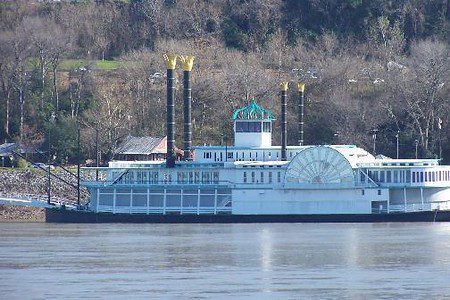
If you’ve watched films such as Maverick , starring famed anti-semite Mel Gibson, or TV shows like Ozark , you will know at least a passing amount about riverboat casinos. They often look like something out of a Mark Twain novel, powered by steam and paddles and are suggestive of a bygone era when you see them floating on the water. In the modern era, of course, they are filled with bright and flashy slot machines that make a lot of noise and ensure that you won’t be expecting Twain to walk around the corner.
The idea behind riverboat casinos was that it would limit the areas in which casinos could be constructed, enabling gambling but keeping it to specifically designated areas. The fact that the boats were seldom taken away from the dock, or even ever taken away in some cases, didn’t change the point that the legal fiction was able to be sold by various authorities. In essence, there is no difference between a riverboat casino and a permanent one on land, with the exception being that boat casinos can get licences to operate where land ones can’t.
The History of the Riverboat Casino
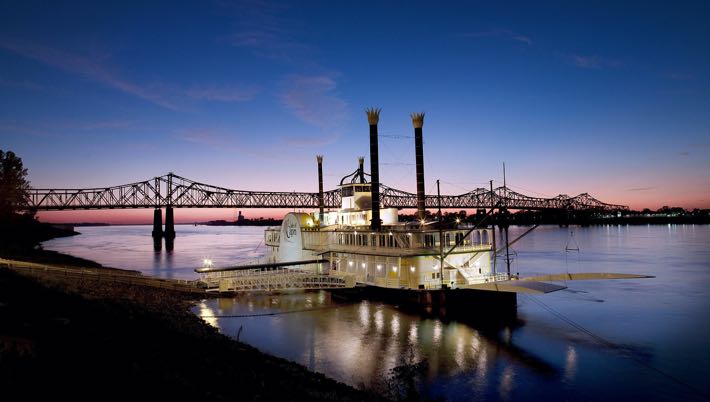
You can’t understand the history of riverboat casinos without first having a sense of the history of riverboats in general. Paddlewheel riverboats were introduced to the Mississippi River and some of its tributaries as a way of transporting passengers and goods during the 19th century. By the 20th century, however, rail had largely taken over as the quickest and cheapest way to get things around the country, meaning that the paddlewheel riverboats needed to be re-invented as something else entirely. This was when they began to be used as floating casinos.
Entertainment for Long Voyages
Of course, gambling and sailing has a long history. Voyages by sea are long and tedious, with ships in the past lacking the entertainment options that you would expect to find nowadays. So it is that sailors and passengers would often engage in games of chance whilst taking part in a long voyage. As life in the United States of America reached a degree of normality in the wake of the American Civil War, riverboats began to be used as a way of enticing gamblers to places where they would otherwise have nowhere to go.
Legal Loopholes
States had widely prohibited gambling in the US by the start of the 20th century, which is why those looking to gamble sought legal loopholes. States began to approve the use of riverboats, especially in ones that had frontage along the Mississippi. It was for this reason that the likes of Illinois, Louisiana, Indiana, Missouri and Mississippi itself began to allow a limited number of riverboat casinos to be opened, attracting gamblers that wouldn’t be allowed to place a legal bet on land in those same states, save for on Native American Reserves.
City of Traverse
The first riverboat casino, the City of Traverse , set sail on Lake Michigan in 1904. The Big Muddy, as the Mississippi River was known, bordered several different states, which made it something of a legal grey area. It was for this reason that Senator Lyndon Johnson helped to draft the Transportation of Gambling Devices Act in 1951. That made it a crime to transport gambling decides over state lines, unless it was legal at the destination. It didn’t stop all riverboat casinos, but it made it trickier for some of them.
What Riverboat Casinos Offer
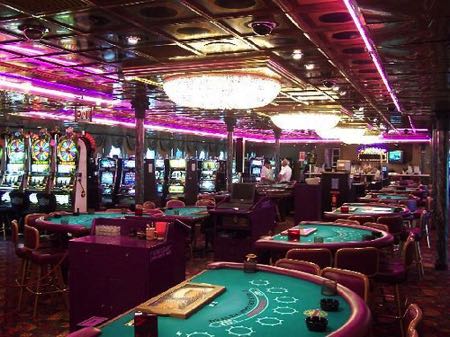
As with casinos on land, riverboat casinos offer different things to customers based on numerous different factors. If a riverboat casino has discovered that very few people in the area enjoy playing poker, for example, then they are going to be unlikely to actively offer a poker room. Similarly, if it is discovered that people heading to one riverboat casino aren’t playing slots, then slot machines will be limited in number. As with land-based casinos, it is the customer that dictates what is and isn’t offered by a riverboat casino, wherever it is located.
That being said, there are some things that you can expect to enjoy at most riverboat casinos. Table games are always popular at such venues, meaning that the likes of roulette, craps and blackjack are commonplace. Equally, slots are usually good money makers for any casino, so a floor that is dedicated to such electronic forms of gambling isn’t unusual. Whilst card rooms for poker games and so on aren’t always found, they also aren’t unusual. In short, if you want to do something specific, it’s worth finding out if the riverboat casino you’re heading to offers it before you get there.
Do They Have to Be Sailing for You to Gamble?
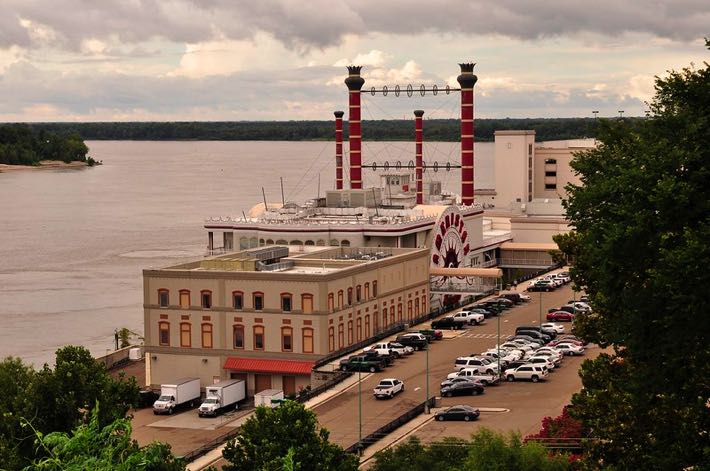
Now that we know a little bit more about riverboat casino and their origin, it is worth asking the question about whether or not they need to be gambling in order for you to be able to place a bet. The short answer is: it depends. Each state has its own rules and regulations around how riverboat casinos have to work, which includes whether or not they need to be sailing for betting to be legal. In the majority of cases, the rule of law states that the casino has to be ‘solely over and in contact with the surface’ of the river it is on.
What this means, in essence, is that the main bulk of the riverboat casino has to be in the water. It can be connected to land by something like a bridge, but it would need to be able to sail away if required to do so by the licensee. To put it another way, in most states, it couldn’t be a building built on the docks or on the side of the river in order to be a legally licensed casino. Instead, it needs to be in a situation where the majority of the vessel is in the water and only a method of getting on board is allowed to be on the nearby land.
The Curious Case of the Potomac River
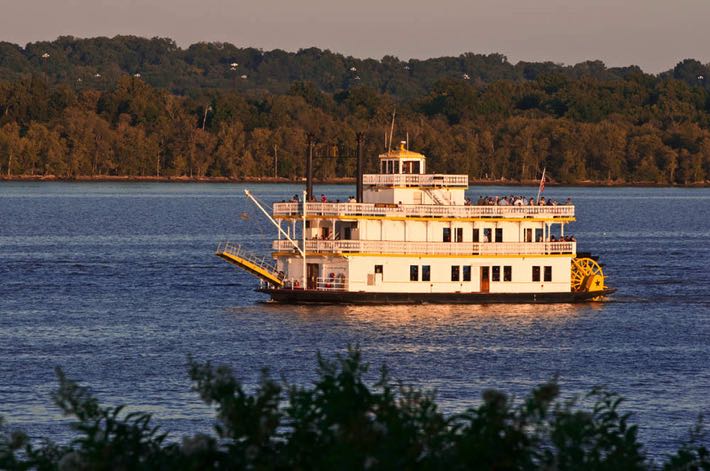
The interesting thing about riverboat casinos is that they regularly end up being in fascinating situations. This is perhaps best demonstrated by the tale of the Potomac River, which is on the state border of Maryland and Virginia. In the middle of the 20th century, there were several riverboat casinos docked off the coast of Virginia, even though gambling wasn’t legal there. The border between the two states isn’t the middle of the river, but rather at the low water mark on the Virginia side of it, confusing things.
The result of the state border being where it is is that, with the exception of a small part of the river that is in the District of Columbia, the majority of the river is technically in Maryland. For this reason, punters could drive to Virginia and park there before walking onto a riverboat casino, at which point they had crosses state lines and were in Maryland. They were then able to gamble entirely legally, all whilst within virtual touching distance of a state where it would have been illegal to have been doing exactly the same thing.
The Riverboat Casinos That Pushed Their Luck
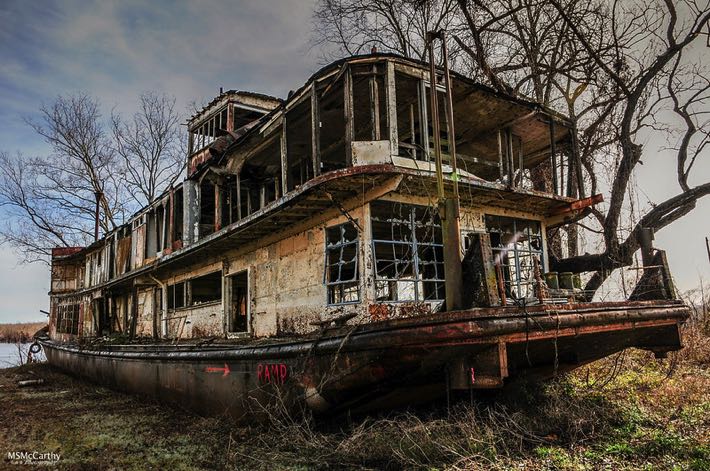
In 1994, it was decided by voters in Missouri to allow ‘games of chance’ to take place on the Mississippi River and the Missouri River. Four years later and the state Gaming Commission believed that just three of the 16 such casinos operating in the river were ‘clearly on the main river channel’. As several casinos had actually been located on riverboats that were in an area with water that was adjacent to the river, such as a lock, it was felt by those that were against gambling in the state that they should be shutdown.
By that point, however, the state had realised just how much was being brought in thanks to tax on the $652 million industry. The state was entirely unwilling to give up the revenues being generated by the riverboat casinos, so over a period of time the rules were relaxed. It got to the point that casinos were allowed to be built on stilts, with the only proviso being that they had to be over water that was navigable. This meant an end to the practice of ‘ Boats in Moats ’ that the area had become quietly quite famous for.
When Hurricane Katrina hit the US in 2005, many of the riverboat casinos were destroyed entirely. The casinos themselves, as well as the hotels and restaurants that adjoined them, were left devastated. What resulted was a decision from many states to change their regulation on the matter, allowing casinos to be built on land as long as they were within certain geographical limits close to a navigable waterway. Since the hurricanes the majority of Mississippi’s riverboat casinos have been rebuilt with far more solid foundations.
Riverboat Casinos & Native Americans
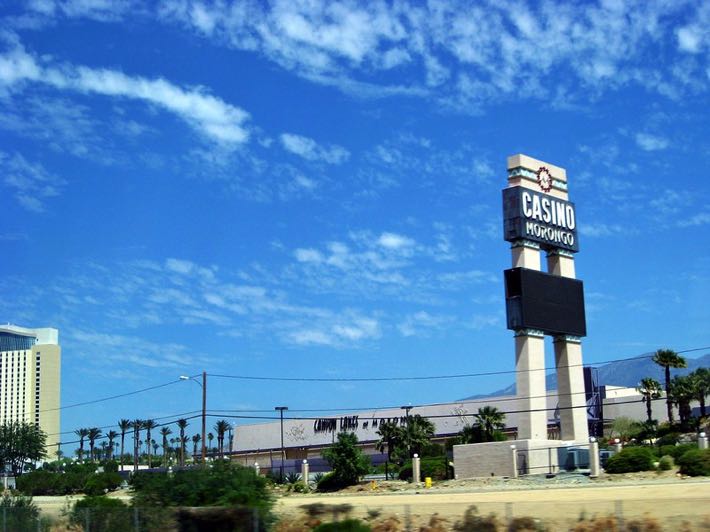
It might seem strange, but those that love riverboat casinos actually owe a debt of thanks to Native Americans. Towards the end of the 1980s, the case of California v. Cabazon Band of Mission Indians ended up in front of the Supreme Court. The state of California believed that the games of poker and bingo that were taking place on the land of the Cabazon Band of Native Americans violated state law. The Native Americans, unsurprisingly, disagreed, believing that tribal land fell under civil regulatory laws, not the lawful jurisdiction of the state.
The Supreme Court found that California’s state lottery meant that gambling was not prohibited as a criminal act, meaning that the authority to regulate any gambling actives on tribal lands fell outside the powers that were granted by the Public Law 280 ruling. This had lasting impact for Native Americans around the sovereignty of their land, including the fact that states could not impose regulations on reservation gaming. Instead, gambling in Native American land could only be questioned if it was in a state where gambling was considered criminal according to the state laws.
This led to an explosion of legalised gambling in states throughout America. The result of this was that states wanted to get in on the act, hoping to open casinos that would allow them to make money whilst limiting the influence of organised crime. The result of this was that riverboat casinos sprang up in places where the geography allowed it, ensuring that most of the new venues owed a lot to the Native Americans that had pursued the right that they believed they had to gamble legally on their own land.
Curious Things About Riverboat Casinos
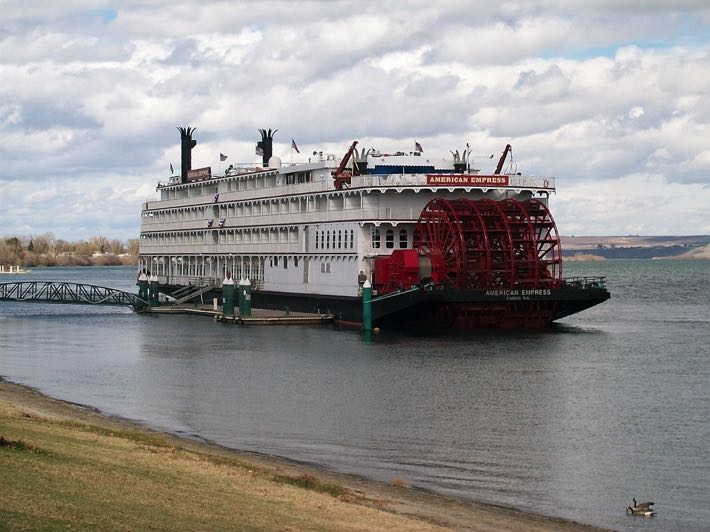
There are numerous different facts about riverboat casinos that are interesting and worth knowing. For example, many historians believe that vigilantes would take the law into their own hands when cheats were found to be operating on riverboat casinos. In 1835, a group of five such cheats were lynched in Vicksburg in the state of Mississippi after having been discovered. Also, when riverboat gambling was first legalised in Louisiana, any vessels operating out of the state had to look like a 19th century paddleboat.
By 2018, there were 63 riverboat casinos operating across the six states where it was legal for them to do so. That year, Illinois took $382.5 million in state tax, whilst it was $152.1 million in Missouri. In terms of examples of riverboat casinos, there is perhaps none as impressive as the American Empress, which is diesel-powered and stands at 360 feet in length. As well as the casino on board, there are also artefacts from the Gold Rush, Russia and Native Alaska, making it a floating museum, as well as a casino.

The Intriguing History of Riverboat Casinos
It’s quite interesting to know that the riverboat casinos are seldom moved away from the dock. Many states authorized this type of casino to put some limits on the gambling activities. The law didn’t allow casinos to be operational on land nor did it allow their construction on land areas. Instead, the casinos had the permission to operate on riverboats.
In recent times, riverboat casinos exist in several American states. They’re located along the Gulf Coast or along the Mississippi River. One can also find riverboat casinos along the Mississippi River’s tributaries. If you are suffering from sea-sickness, you can always play online casino. Check out Casinos Jungle , the #1 online casino platform in the US and in Canada.
Paddlewheel riverboats in the 20th century
In the early 20th century, there were paddlewheel riverboats to transport passengers and freight on the Mississippi River. The tributaries of this river also had these boats for transportation. Then came a time when the railroads became popular for transporting freight and passengers. As a result, these riverboats became increasingly useful for excursions that lasted several hours.
Instead of transporting people between riverfront towns, they were more of an escape from the crowds. They began hosting dancing and live music. Soon, they became popular places for gambling with the use of slot machines and card games.
Approval and prohibitions
In the late 20th century, the riverboat casinos got the approval of states. Most of the states had prohibitions in place for gambling activities on land. As these riverboats operated casinos in them, they had to sail away from the dock. At certain places, gambling activities were allowed only when the ship was sailing.
Indiana, Illinois, Louisiana, Missouri, and Mississippi were some of the states that allowed riverboat casinos. The state of Illinois also allowed limited number of casinos in the metropolitan area of Chicago. Most of the states that gave an approval for riverboat casinos have a frontage along the Mississippi River.
River border situation between Maryland and Virginia
During the mid-20th century, a quirk in the state border between Virginia and Maryland led to an unusual situation. The border is on the Virginia side at the low water mark and not in the middle of the river. So, the entire river falls in Maryland except for some small portions.
This led to several riverboat casinos being docked off to the Virginia shores. This happened in the 1950s, when gambling was not legal in Virginia. The visitors had to park in Virginia and walk across a pier, as the river was in Maryland.
Amending of the state constitution
In the year 1994, voters in Missouri gave their approval to amend the state constitution. This was to allow games of chance to continue on the Missouri and Mississippi rivers. Only some part of Missouri’s riverboat gambling industry were clearly on the channel of the main river by 1998. According to the ruling of the state’s supreme court, the boats had to be solely over the surface of the rivers.
These boats were also required to maintain contact with the rivers’ surface. Casinos had to be in a moat on these riverboats. They could also be in a place with water adjacent to a waterway that was navigable. This led to the riverboats being referred to as ‘boats in moats’.
Leave a Reply Cancel reply
Your email address will not be published. Required fields are marked *
Save my name, email, and website in this browser for the next time I comment.
Riverboat casinos – why does the casino have to be on a boat?

A riverboat casino is exactly what it sounds like: a casino on a riverboat. These exist in several US states, through which the Mississippi River flows. There are also some along the Gulf Coast. A few states allowed this type of casino to limit the areas where casinos could be built without outlawing gambling . The riverboats were rarely moved away from the port, if ever.
History of riverboat casinos
Riverboats with paddlewheels had long been used on the Mississippi and its tributaries to transport cargo and people. After they were largely displaced by railroads, they became more popular for short trips, up to a few hours long, than as transport from one riverfront town to another. They were also a way to enjoy live music and dancing and find a cool place to relax, away from the scorching urban heat.
On riverboats, gambling was far from uncommon
There were card games, slot machines , and more. When states approved riverboat casinos in the late 20 th century, and land-based gaming was generally prohibited, these casinos had to be located on ships. In some areas, gambling was legal only when the boat was not docked, as in the traditional trips. Riverboat casinos were allowed in states like Illinois, Indiana, Louisiana, Mississippi, and Missouri. In Illinois, they were also allowed in the Chicago metropolitan area, which is connected to the Mississippi River via the Chicago Sanitary and Ship Canal. There are three ‘riverboat’ casinos in harbors along Lake Michigan in Indiana.
A curious event
A situation on the border between Virginia and Maryland led to an unusual event on the Potomac River around 1950. The border is at the low water mark on the Virginia side, not in the middle of the river. In fact, the whole river is practically in Maryland with the exception of a few small areas in the District of Columbia. Due to this, there were several riverboat casinos docked off of the Virginia shoreline in the middle of the 20 th century. At this time, gambling was not legal in Virginia, but it was legal in parts of Maryland. Considering that the river was in Maryland, people could park in Virginia and walk across a pier, thereby crossing the border between the states.
Developments in the 90s
In 1994, Missouri changed its state constitution to authorize “games of chance” on the two rivers running through the state: the Mississippi and the Missouri. Four years later, just three of the 16 operations comprising Missouri’s riverboat gambling industry, already worth more than $600 million, were clearly on the main river channel according to the state’s gambling watchdog, the Gaming Commission. The supreme court of the state had ruled that riverboats had to be “solely over and in contact with the surface” of the rivers.
A number of operators had been located on riverboats in an area with water by a navigable waterway or a moat, due to which they were referred to as “boats in moats.” The state legislatures were not inclined to waive the high revenues gambling generated. With time, they let casinos be constructed on stilts, but they had to be located over navigable water.
Hurricane Katrina and its aftermath
After Hurricane Katrina destroyed most riverboat casinos in 2005 along with their associated facilities of restaurants, hotels, and more in southern states, a number of them amended their constitutions or changed their legislation. They allowed casinos to be constructed on land near a navigable waterway. Most of the riverboat casinos on Mississippi’s Gulf Coast have been rebuilt on beachfronts with stable foundations after the hurricane.
The future of riverboat casinos
Riverboat casinos will always be a popular form of entertainment along the Mississippi. People can enjoy playing in these historic paddleboat gaming hubs in Illinois, Iowa, Louisiana, and Mississippi as this mighty river flows across many different state lines. It is the second-longest river in North America, flowing out from its estuary in Lake Itasca, Minnesota through the heart of the country and flowing into the Gulf of Mexico. Its total length is 2,350 miles.
The mighty river was the center of economic activity in the 19th century south. This geographical region was famous for the paddle steamers that used to cruise up and down the Mississippi long before online casinos existed.

Leave a Reply Cancel reply
Your email address will not be published. Required fields are marked *
Save my name, email, and website in this browser for the next time I comment.
Casino Player Magazine | Strictly Slots Magazine | Casino Gambling Tips

- Caribbean Stud
- Sports Betting
- Three Card Poker
- Online Gaming
- Video Poker
- General Gambling Tips
- Player's Club
- Money Management
- Monthly Entertainment Guide
- Entertainment News and Headliner Interviews
- Where to Play
- Casino Player
- Strictly Slots
- Subscriber Services
- Print Advertising
- Digital Advertising
- Website Advertising
- Certified Loose Slots Program
- Best of Awards
- Employment Opportunities
Rolling on the Rivers – Riverboat Casino
Editorial Staff | Posted on April 10, 2010 |
After 15 years of evolution, riverboat casin o s have become resort destinations in and of themselves
By frank legato.
Consider the term “riverboat casino.” These days, the term conjures up images completely different than when the modern riverboat gaming industry was inaugurated in Iowa some 15 years ago. Back then, riverboat casinos were little more than a means of bailing out state budgets—of clearing red ink in government ledgers without raising taxes.
The idea was to use gambling to raise money, but to restrict it to waterways¬. To distinguish them from “real” casinos, as existed only in Atlantic City and Las Vegas, they would be kept from land, thereby saving “respectable” people from the specter of gambling in their neighborhoods. To give them charm and appeal for gamblers, they would recall the times of Mark Twain, designed as replicas of legendary 19th century paddlewheel steam riverboats on which frontier characters played draw poker while floating lazily up and down the Mississippi River.

Riverboat casinos, once viewed as a necessary evil to communities in which they were legalized, grew to be vital parts of those communities, providing jobs and economic revival to depressed areas, and donating millions to local charities. For the people who played there, the vessels became hot regional destinations, providing escapes for drive-in customers and great gambling deals for the locals.
Anthony Sanfilippo, president of Harrah’s Entertainment’s Central Division, has been operating in the riverboat market since the early days. He has been with Harrah’s for nine years, and he says the past decade has seen changes not only in the way players see riverboat gaming, but in the way communities see the casinos.
“The main difference today is the acceptability of gaming in communities that were considered new jurisdictions 10 years ago,” Sanfilippo says. “Ten years ago, gaming was stereotyped—from movies, mainly—and communities didn’t have an understanding of their economic impact in the local community and state, as well as the ability to bring a whole new type of entertainment experience into their community.”

Those two vessels would eventually grow into what is now Isle of Capri Casinos, Inc., but first, Goldstein faced quick competition, both in Iowa and across the river in Illinois. The biggest threat to those first riverboats, though, was Iowa’s own gaming law, which imposed a limit of $5 per bet and a “loss limit” of $200 per person, per cruise. With boats required to cruise during the warm months, that meant if a customer lost $200 in the first half-hour of a two-hour cruise, he was stuck doing nothing for the other hour and a half.
Nearby states were quick to pick up on the fact that gamblers were looking for less restrictive rules. In September of 1991, Illinois launched its riverboat gaming market, with no bet restrictions or loss limits. The following year, Goldstein moved his two original boats to the Gulf Coast to become the first to open in Biloxi with his renamed Isle of Capri casino. Not only did Mississippi allow casinos to operate without betting restrictions; there was no cruising requirement. Vessels were permanently docked, and—for better or worse, as we now know—most were built on barges directly on the water, forming what were essentially floating land-based casinos.

The first riverboat casinos made money through what is known in the trade as “convenience gambling,” meaning people went there solely because it offered gambling close to home. The ability to gamble without traveling to Las Vegas or Atlantic City made up for the fact that typically, one would find slots and table games cramped on several levels of a paddlewheeler. Little comfort, lots of action.
However, as with most forms of entertainment, increased competition ultimately led to better offerings, larger facilities, and a wealth of choice for the player. This was aided by the fact that the Indian gaming market was launched at essentially the same time as the riverboat market. Racinos were not far behind; nor were new land-based commercial casinos in markets like Detroit. Riverboat casinos could no longer afford to be convenience gaming outlets. They now had to compete for their customers with a collection of gaming choices that was not even on the radar of the visionaries who started riverboat gaming in the early 1990s.

Many of the older multi-level paddlewheel riverboats were replaced by massive single-level vessels with as much casino space as many traditional land-based casinos. Riverboat gaming operators expanded landside entertainment and dining complexes, added hotels, and built golf courses.
Riverboat casinos were no longer cramped vessels where gamblers put up with crowded conditions and discomfort for the sake of laying down a bet. They were resorts.
Evolution of the Offering Sanfilippo of Harrah’s says he has watched the riverboat market grow from gambling joints into full-blown destination resorts. “Early on, the experience was centered around pure gambling, with some food offerings,” he says. “Over 10 years, we’ve seen an evolution of our offerings. For example, at our Horseshoe Hammond, we are under way with a complete renovation that will transform the property.”

While many improvements and expansions have been made to the landside dining and entertainment facility, the multi-leveled vessel itself had little room for improvement. The $485-million makeover of Horseshoe Hammond will replace that vessel with a huge riverboat placing all gaming on one level. On the second level of the new boat will feature a state-of-the-art entertainment venue, two celebrity chef restaurants and a 2,500-seat buffet. New shore-side facilities will include Diamond and Seven-Star Lounges for top players. The expansion will be complete in the summer of 2008.
Horseshoe Hammond’s new facility will demonstrate something that has become common over the evolution of the riverboat gaming market: Riverboats these days are destinations, in and of themselves, and they are viable alternatives to the plane trip to Las Vegas or the larger land-based casinos of Atlantic City or Connecticut.
“The (riverboat) markets have evolved to where the non-gaming aspects of the properties are much more important,” says Wade Hundley, president of Pinnacle Entertainment, the Las Vegas-based company that operates two of the most elaborate riverboat properties in the nation, Belterra in Indiana and L’Auberge Du Lac in Lake Charles, Lousiana. “These are entertainment destinations rather than several decks of gaming.”

He adds that at the same time the non-gaming amenities have been proliferating, the riverboat markets have maintained the familiarity with their customers possible only in locals markets. “The riverboat properties will give you more personal attention than many Las Vegas properties,” says Hundley. “Your personal relationship with employees is much more evident, because Las Vegas tourist properties may see customers a couple of times a year, where in regional markets, you see them much more often.”
Hundley predicts that the riverboat market will continue to evolve along the lines of offering the best in non-gaming entertainment and pampering to go with the gaming experience. “Our company believes in building world-class destination resorts,” he says. “That’s the type of property that will be successful in the future. You want to be able to get a free spa visit or a steak dinner, and play a round of golf. People can get these things in Las Vegas, so you have to offer the same kinds of amenities—and they can get them without having to go to an airport, go through security, and go through all the other hassles that come with traveling far away.”

Tourism based on gaming entertainment—it’s a concept that once was confined to markets such as Las Vegas and Atlantic City. Nowadays, the Midwest riverboat markets offer an experience that is, in the end, worth the trip.
The Gems You will, in fact, find something worth the trip in each riverboat region of the country. Here are a few of the gems to be found in each of the riverboat states:
Iowa Much of the first riverboat gaming market remains as it was when it launched the industry in the early 1990s. While they can now remain docked and can operate without the silly betting restrictions, most of the 10 Iowa riverboats are still simple and small.
The exceptions to this rule are obvious every year when we do our “Best of Gaming” survey. Iowa’s two “category-killer” riverboat casinos are in Council Bluffs—Ameristar and Harrah’s. Over in Bettendorf, Isle of Capri’s second Iowa entry is definitely worth a visit as well.
Ameristar Council Bluffs This massive paddlewheel-style riverboat features around 38,000 square feet of casino space spread over three levels, with 1,651 slots and 31 table games. A great player’s club offers frequent 4X-point days and cashback on both slots and tables. Ameristar would be a typical old-fashioned riverboat casino, except for all the stuff that goes along with the games, much of it on the shore-side complex: great restaurants, including the much-acclaimed Waterfront Grille for the best steaks in the market; a 160-room hotel including eight beautiful luxury suites, 32 unique “king whirlpool rooms” and great river views; lounge entertainment at two cabaret bars, and headliners at the Amerisports Bar. In short, all the casino comforts in a river setting.
Harrah’s Council Bluffs Similar in style to Ameristar—a three-deck paddlewheel vessel with hotels and restaurants on shore facilities—Harrah’s consistently gets our readers’ nod as the best overall riverboat casino hotel in Iowa. With just over 1,000 slots and around 35 table games spread over three levels, the gaming is comparable to Ameristar, with the added benefit of the Harrah’s Total Rewards national player’s club. Harrah’s also is known for its great 240-room hotel; restaurants such as the 360 Steakhouse and the ’50s-style Ace’s Diner; and the hip Stir nightclub.
Isle of Capri Bettendorf Isle deserves honorable mention in Iowa for the property it built in the location of the property that inaugurated the riverboat market, Bettendorf. While gaming offerings are on par with other riverboats its size (like the Council Bluffs boats, it is a three-level, paddlewheel-style vessel), the adjacent 256-room hotel is outstanding, from its elegant lobby to comfortable standard rooms to the fantastic theme suites.
Illinois Illinois has nine riverboats, with the 10th license still wrapped up in the courts with legal challenges from Emerald Casino, Inc., over the revocation of its license.
The other nine riverboat casinos are mostly smaller properties, with a few large gems. There is still a $5 admission fee, although some properties, such as Harrah’s, have waived it if you flash a player’s club card. The best feature of many—and a large reason for their popularity—is proximity to the city of Chicago. In fact, the four Illinois casinos and five Indiana casinos which are all within an hour’s drive of Chicago, and which form the casino market commonly known as “Chicagoland,” constitute the third-highest-grossing casino market in the country.
Gems on the Illinois side of Chicagoland include Harrah’s Joliet and the Grand Victoria in Elgin, but one other Illinois casino far from Chicago deserves honorable mention—the Casino Queen in East St. Louis, on the Missouri border.
Harrah’s Joliet Located around 30 miles from Chicago, Harrah’s Joliet is casino on a barge docked on the Des Plaines River. During the third quarter of 2001, the two existing riverboat casinos, which had been linked by a “transition barge” after Illinois approved dockside gaming in 1999, was replaced with the single-level, Vegas-style casino. Shore-side facilities adjacent to the casino include a pavilion featuring a lounge and a retail shop, and n 11-story luxury hotel with a fitness center. You will find some of the best video poker in Chicagoland here, as well as great headline entertainment at the Stage 151 concert venue.
Grand Victoria Docked on the Fox River in Elgin, around 31 miles from Chicago, the Grand Victoria is a classic paddlewheeler on the outside, but once inside, you’d never know it. The casino’s spacious single-level interior, housing around 30,000 square feet of gaming space, sports the classic elegance of a high-end Las Vegas-style design. Grand Victoria is one of Chicagoland’s most popular casinos, and our readers consistently vote it Best Casino in the market because of good rules on the table games, great cashback and comps, and the best dealers and hosts in the business. If you go, don’t forget to visit Buckingham’s for great steak.
Casino Queen Across the state from the Chicagoland market in East St. Louis, you will find the casino with the loosest slots in the nation. This classic paddlewheel riverboat with its 27,500-square-foot casino did something last year that no other casino in the nation has been able to do: it unseated the Las Vegas locals casinos for the crown of Loosest Slots in the Nation, returning a remarkable 95.13 percent of all wagers to players, in all denominations. Among the other pleasant surprises here are a first-rate hotel, a great sports bar, and a fantastic steakhouse called the Royal Table.
Indiana There are two distinct markets for riverboats in Indiana—the five casinos on the Indiana side of the Chicagoland market, and the southern Indiana casinos along the Ohio river, which serve the Cincinnati, Ohio, and Louisville, Kentucky markets. In all, there are 10 riverboat casinos, with an 11th on the way in French Lick, to be placed on a man-made lake between two resort towns.
In the Chicagoland area, there is one Indiana choice that stands out above all the others—Resorts East Chicago. In the South, there are three standouts—Caesars Indiana, Argosy Lawrenceburg, and the fabulous Belterra.
Resorts East Chicago Resorts East Chicago, the massive yacht-style riverboat that opened as Harrah’s East Chicago, is the clear choice as the best casino in the Chicagoland market. Harrah’s sold the 53,000-square-foot casino a year ago to Resorts International Holdings, as part of the divestitures associated with its takeover of Caesars. Thankfully, Resorts has not altered it significantly. In our annual reader survey, this property consistently ranks as the best overall hotel casino in the market, along with the best rooms and suites, in the 286-room adjacent hotel.
Caesars Indiana This is one of those riverboat properties which, if seen only from the inside, is virtually indistinguishable from an upscale Las Vegas resort casino hotel. Caesars Indiana is attached to one of the most beautiful hotels in the market, its elegant lobby awash in marble befitting the familiar Roman theme. The riverboat itself, on the 5,000-passenger side-wheel style vessel dubbed Glory of Rome, is the largest riverboat casino in the world, with some 90,000 square feet of gaming space. There is fantastic slot selection, great video poker, and top-notch table games and poker room. You can’t go wrong here.
Argosy Lawrenceburg Another behemoth on the Ohio, Penn National’s Argosy Lawrenceburg casino—the closest to Cincinnati—features some of the best slots and video poker in southern Indiana, as well as another great hotel. It is one of the most popular riverboat casinos in the nation, not only for its games—2,300 slots and 80 tables spread over three levels—but for a promotion-rich slot club that many consider the best in the market.
Belterra And then there’s Belterra. Pinnacle Entertainment’s Belterra property is not as large as its neighbors, but is one of the very best riverboat casinos in the country. The two-tower hotel is twice as large as competing locations, a recent expansion bumping the room count to 608, including 57 luxurious suites. Staying at the hotel gives you access to a package of top amenities dominated by a championship golf course. The casino is just as good: The slot floor stocks the newest games on the market. Table games include five-deck blackjack and 10-times odds on craps. In short, what’s not to like?
Missouri Missouri has 11 riverboat casinos, but there are only two names you need to know: Ameristar and Harrah’s. Ameristar operates top properties in Kansas City and St. Charles, and between those properties and the Harrah’s casinos in St. Louis and North Kansas City, the two operators dominate the market.
Ameristar Kansas City / St. Charles This is a remarkably beautiful dockside casino, its two levels bedecked in gold and elegant trappings. It is a consistent winner of most of Player’s top awards for Missouri in the annual survey—clearly a favorite of players for its hotel, its restaurants, its slots, its tables, blackjack, entertainment and restaurants. As far as Missouri goes, this is the place to be. Ameristar St. Charles, recently refurbished to the tune of $360 million, is not on par with the Kansas City property. By next year, the St. Charles property will add a new 25-story hotel tower housing 400 luxury suites.
Harrah’s St. Louis Harrah’s dominates downtown St. Louis with this huge dockside facility, featuring a total of 120,000 square feet of gaming space. Harrah’s gets high marks for its hotel rooms—including some great room packages—as well as its casino promotions, and of course, the typical Harrah’s service and the ever-present Total Rewards national player’s club.
Louisiana Louisiana has 15 riverboat casinos spread out across three regions—Baton Rouge/New Orleans, Shreveport/Bossier City, and Lake Charles. The two standouts in the state are operated by Harrah’s (which also operates a land-based casino in New Orleans) and Pinnacle Entertainment.
Horseshoe Bossier City When Harrah’s Entertainment acquired the Horseshoe brand a couple of years ago, one of the best properties that came with it was the Horseshoe riverboat in Bossier City. Built by Jack Binion as the first casino in the market, it is a beautifully elegant paddlewheeler with some of the best poker, table games and slots in the state. It is adjacent to a magnificent 606-room, all-suite hotel with some of the best resort amenities to be found anywhere in the riverboat market.
L’Auberge du Lac The newest riverboat casino in Louisiana is also the best. Pinnacle’s L’Auberge du Lac Hotel & Casino is simply gorgeous, its single-level dockside casino only one part of an amazing resort set on 227 acres. Pinnacle has here reprised the formula that worked so well at Belterra, with a 600-plus room, high-end hotel feeding the central feature of the resort—a Tom Fazio-designed, 18-hole championship golf course. As we said with Belterra, what’s not to like?
Rolling on the Rivers – Riverboat Casino.

- All News Stories
- Focus on Partners
- From the Floor
- Women Rising in Gaming
- Black Execs on the Rise
Here’s why riverboat casinos are moving to land
- United States
- Commercial Casinos
At first glance, Hollywood Casino Aurora looks like a typical casino. It’s got the grand entrance and the big parking lot, and, inside, there are rows upon rows of slots and table games.

But the casino is anything but typical; it’s part of the dying breed of riverboat casinos that are moving from water to land as gambling becomes more widely accepted in the United States.
Earlier this year, Penn Entertainment, the casino’s owner won approval from the Illinois Gaming Board to move the casino from the calm waters of Fox River to the dry land of Stolp Island. The casino’s future move punctuates the final chapters of what once was a thriving industry in states where gambling was once taboo.

No related posts.
© 2024 CDC Gaming Reports Inc.
Receive Info From G2E
A former photographer, Jonathan has written extensively about the gambling industry over the last few years. Though perfectly happy chatting at a gaming trade show or lounging in the casino, his favorite place is on a motorcycle with his trusty hound, Yol...
- Riverboat Casinos – Why Do They Need To Be On Water? /
Riverboat Casinos – Why Do They Need To Be On Water?
- October 25, 2022 08:22AM
- October 25, 2022
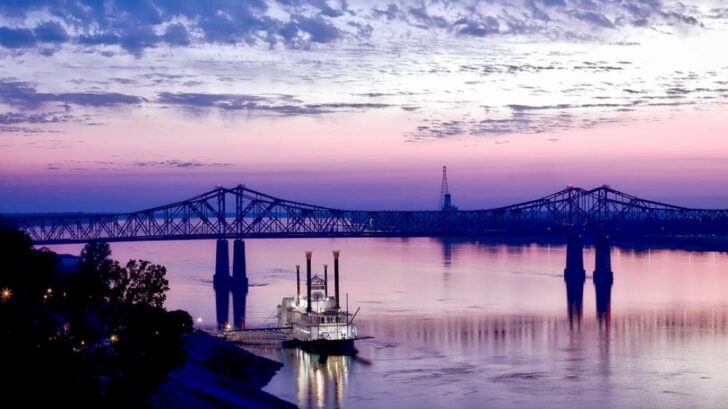
Why Do Some Casinos Have to Be on Water?
When most people think about casinos, they imagine them being on the land. When you consider the sheer size of the world’s most famous casino resorts, then this is no surprise. But did you realize that quite a large number of gambling establishments actually sit on bodies of water? For example, many of these will be what is known as “riverboat casinos” which are permanently docked. This lead to the question of why casinos are built on water? Read on to discover the answers in greater detail.
22Bet Casino Welcome Bonus
122% match bonus up to €300, some states only allow gambling on waterways.
Because we’re all now used to gambling at online casinos to win the jackpot using our mobiles at home with casinos like 22Bet Casino , it sounds crazy that some States only allow gambling when situated on the water. However, many casinos have no other choice. Below we’ve listed the different US States that feature water-based casinos, along with the specific rules that appertain to them.
Riverboat Casinos In Illinois
You can thank the Illinois Riverboat Gambling Act of 1990 for making concessions for riverboat casinos to exist. The very first riverboat casino was in commission to operate out of Alton in 1991. For this, Illinois State only allowed river boats that were actually moving for gambling activities. But since the amendment of this rule, boats can now dock permanently and work as casinos as well. On board, you’ll find all the usual traditional games such as roulette, jackpot poker , craps, blackjack , and any number of slot machines.

Hoosier State passed the Indiana Riverboat Casino Act of 1993. This first allowed water-based gambling. In fact, it permits riverboat casinos on all major waterways throughout the State. In the same manner, as Illinois, Indiana used to require boats to be moving on the river before gambling could start. But thanks to the Riverboat Casino Act being amended in 1999, boats were allowed to operate for the first time as casino gaming establishments. You’ll find that Indiana’s riverboat casinos are full of the usual gambling fare, ranging from jackpot slots to blackjack. On the whole, the vast majority of these boats tend to operate on either Lake Michigan or the Ohio River. It’s also possible to find a few casinos that operate on inner State rivers as well.
Riverboat Casinos In Iowa
In 1989, the state of Iowa first authorized excursion boats for gaming. You can find these boats operating legally up and down the Mississippi River. Iowa has been keen to embrace gamblers and casinos and to that end has added Recinos and traditional Vegas-style casinos as well. You’ll find that the excursion boats offer traditional games as well as working as commercial venues. This puts them in a very good position to compete with their land-based brethren.
Play Slots Online at the 22BET Casino
Historically, Bayou State has always been associated with riverboat gambling . To that end, it’s no surprise that you’ll find plenty of riverboat casinos in the state. Originally, riverboat gambling was encouraged under the political banner that read “A historic riverboat industry is important to the States economy.” Because Louisiana is so dependent on the tourism industry, it’s no surprise that politicians are always pushing this as it’s a great way to bring in revenue. Though Louisiana does have both commercial and tribal casinos, you’ll find that the vast majority of gaming venues are actually on board river boats.
One interesting aside about riverboat gambling in Louisiana there’s a stipulation that used to state that all riverboat casinos must be paddle-powered. A recent amendment now allows riverboat casinos to move up to 1200 ft onshore. Obviously, this has made the whole paddle legal situation redundant today.
Mississippi

Mississippi has enjoyed a long history of riverboat gambling, though officially this type of gambling was only legalized in 1990. Since then, Magnolia State has developed a thriving water-based gaming industry. You’ll find plenty of casinos on the Mississippi River and the Gulf Coast. Unfortunately, in 2005, Hurricane Katrina wiped out many of these casinos. Since then, State politicians have taken steps to ensure this could not be repeated. They have since amended the rules so that casinos can now be built up to 800 ft on shore.
Today Mississippi has an incredibly lucrative casino industry. In main, this is thanks to its very relaxed gambling laws. These include such things as no betting limits and 24/7 operating hours. As with many other casinos in this list, all riverboat casinos in the Mississippi will offer such games as blackjack, roulette, craps, baccarat, and slot machines.
Riverboat Casinos In Missouri
Riverboat casinos in the Show Me State were approved in 1992, though they did come with some severe restrictions. One of the most painful of these was that the boats could only operate as casinos for 2-hour cruises. Once the cruise is over the boat would need to return to shore and all gaming would cease until its next outing. Also, to keep an eye on the social acceptance side of gambling, players can only lose up to $500 on each cruise.
Another factor in trying to promote responsible gambling was that giving out drinks as comps was no longer acceptable. However, in 1986 Missouri lawmakers relaxed the restrictions and got rid of the 2-hour cruise rule. In 2008, the $500 loss limit was also ditched. Writing today, we can see that Missouri has one of the most lucrative gaming industries in the whole of the US.
Why Do These States Only Permit Casinos on Water

Each and every US State has its own stance on casino gambling. You have to consider that some States are very much against gambling altogether including Utah and Hawaii. These have come out strongly against gambling and all casinos a banned. Yet with many states’ finances always in a perilous position, it’s not surprising that today more and more states are legalizing gaming. Obviously, they ensure that all casinos have a proper gaming license . Thanks to some of these rather strange restrictions, some casinos can only legally operate on water. The main reason for this is that this is a way of circumnavigating local laws without having to amend their constitutions.
As a result, you’ll find that virtually all States that allow water-based gambling have their own unique rules and regulations in force. A good example of one of the strangest of these was the Louisiana paddle boat rule.
Are Riverboat Casinos Any Different than Regular Casinos?
In terms of location, water-bound and land casinos couldn’t be further apart. But having said that, when you visit a riverboat casino, you could easily imagine you are actually on terra firma. That’s simply because many riverboat casinos no longer have to move down waterways and can now remain docked in certain spots permanently. Mind you, it’s true to say that there’s an absolutely different feeling when first walking onto a riverboat casino when compared with walking into a brick-and-mortar one.
That’s because riverboat casino certainly hasn’t lost its romantic allure. You can feel as if you’re going back to the frontier days of the 1880s when riverboat gambling was extraordinarily popular. But other than this nostalgic feeling, there is not much to differentiate between gambling in commercial casinos, tribal casinos , racinos, or riverboat casinos. You’ll find that they all offer more or less the same games including blackjack, roulette, slots, and craps. In fact all the same games you can find if you want to win the jackpot online at an online casino like 22Bet Casino .
Click here to visit the 22BET Casino to discover a brand new world of online gambling
About the Author
// More From jonathan

How To Find Gambling Success With Development Philosophies

The Top Most Exciting Horse Racing-Themed Slot Games

A Complete Guide To The Tour De France

Can Adult-Centred Las Vegas Ever Be Family Friendly?

Japan’s First Casino Get The Go Ahead In Osaka

A Complete Guide To Winning The Lottery Online
// Recommended by Experts

1xBET Sportsbook
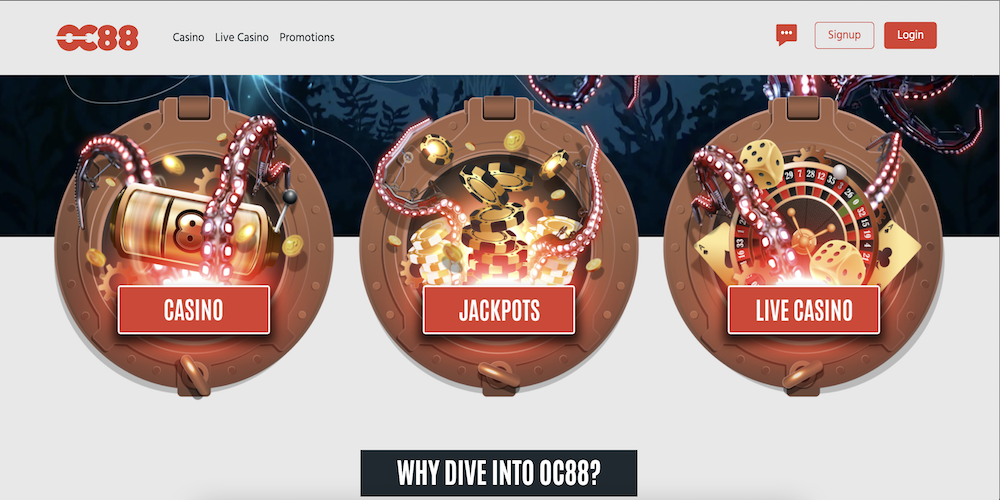
OC88 Casino

22Bet Casino

Bet365 Casino
// latest promotions.

Omni Slots Casino Claim the Double Offer: Win up to 50 Free Spins

Summer Bingo Tourney at Vegas Crest Casino: Win up to €1000

Omni Slots Casino Free Spins Offer: Get 40% Bonus + 40 FS

Play Powerball Online at theLotter: Win Up To $ 125 Million

Secret of Atlantis at Everygame Casino: Win Up to $30,000
How 4 of your Delaware River bridge tolls changed this month

CAMDEN — Tolls have increased for South Jersey motorists crossing four bridges over the Delaware River.
The $1-increase to $6 took effect Sept. 1 for the Betsy Ross, Benjamin Franklin, Walt Whitman and Commodore Barry bridges.
Commissioners of the Delaware River Port Authority, which operates the spans, voted unanimously for the increase at a meeting July 17.
Shutting down: A popular bakery in Burlington County is closing. Here's what ownership said.
That followed a decision earlier this month to reduce a proposed increase of $1.50.
The toll hike, the first in 13 years, doesn't affect fares for the DRPA's PATCO Hi-Speedline.
It also has no impact on cash tolls of $4 for the Tacony-Palmyra and Burlington-Bristol bridges, which are run by a Burlington County commission.
And it does not affect the $5 cash toll on the Delaware Memorial Bridge between South Jersey and Delaware, which is operated by a separate bi-state authority.
The DRPA initially considered a higher toll of $6.50, a 30% increase based on the consumer price index for the Philadelphia area.
But the board's finance committee proposed the reduction July 10.
The full board approved that 20% increase at its July 17 meeting.
Why is toll $6?
"We've been fiscally responsible," the DRPA's CEO John Hanson said about raising the toll at a lesser rate than inflation.
In the past 13 years since the last toll increase, Hanson said, the DRPA has invested $1.9 billion into capital improvements and paid off $700 million in debt, aiding in the decision to trim the increase.
Gaudreau crash: A GoFundMe for expectant father Matthew Gaudreau has already shattered its goal
What will toll money be used for?
"We want to make sure that our bridges are safe," DRPA Chairman James Schultz said.
More: Interactive map shows rating for Camden, Gloucester county bridges
Money from the toll increase is to be used to bolster the bridge's police department. Schultz said the department has 120 officers when it should have 150.
He also noted the importance of keeping commuters safe in light of the Baltimore bridge collapse that occurred in March.
Kaitlyn McCormick writes about trending issues and community news across South Jersey for the Courier-Post, The Daily Journal and the Burlington County Times. If you have a story she should tell, email her at [email protected]. And subscribe to stay up to date on the news you need.
Enoch Cree Nation breaks ground on hotel expansion of River Cree Resort and Casino: 'Be the catalyst'
You can save this article by registering for free here . Or sign-in if you have an account.
Article content
Members of Enoch Cree Nation, partners and supporters gathered outside the River Cree Resort and Casino as they announced their new hotel expansion on Friday.
Enoch Cree Nation broke ground on the new $200-million project, which will be fully funded by the nation, and there will be no debt servicing from any other funds. The hotel is expected to open in spring 2027.
Subscribe now to read the latest news in your city and across Canada.
- Exclusive articles by David Staples, Keith Gerein and others, Oilers news from Cult of Hockey, Ask EJ Anything features, the Noon News Roundup and Under the Dome newsletters.
- Unlimited online access to Edmonton Journal and 15 news sites with one account.
- Edmonton Journal ePaper, an electronic replica of the print edition to view on any device, share and comment on.
- Daily puzzles, including the New York Times Crossword.
- Support local journalism.
Create an account or sign in to continue with your reading experience.
- Access articles from across Canada with one account.
- Share your thoughts and join the conversation in the comments.
- Enjoy additional articles per month.
- Get email updates from your favourite authors.
Sign In or Create an Account
Confederacy of Treaty 6 Grand Chief Cody Thomas said Friday marked a historic day for the nation and said the expansion is about increasing the standard of living through creating job opportunities and building capacity.
“There’s an opportunity for us to build capacity in our next generations to come but provide sustainable resources for our nation as well,” Thomas said.
“We always want to be the catalyst and create a template for other First Nations … If we can do it as well as uplifting one another, that’s the goal. Our brothers and sisters shouldn’t be left behind. As a nation, we’re always prospering in the direction of finding tangible solutions for all of us to mutually benefit.”
River Cree Resort and Casino opened in 2006 and was later fully acquired by Enoch Cree Nation in 2014.
The new hotel will include an 18-storey tower, 240 hotel rooms, 38,000 square feet of event space (with a grand ballroom and outdoor space) and a family-friendly pool with two waterslides.
‘Showcase our culture’
Vik Mahajan, the CEO of River Cree Resort and Casino who has been with the organization since 2013, said as he continues to work with Enoch Cree Nation, Indigenous culture is “going to be shown in everything that we do.”
Get the latest headlines, breaking news and columns.
- There was an error, please provide a valid email address.
By signing up you consent to receive the above newsletter from Postmedia Network Inc.
A welcome email is on its way. If you don't see it, please check your junk folder.
The next issue of Headline News will soon be in your inbox.
We encountered an issue signing you up. Please try again
“T his expansion is going to mean a lot, not just for the community that will benefit from it as customers as well as economic benefits, but it will also be huge for the city Edmonton area as well as the whole province,” Mahajan said.
“W e want to be able to house everybody, bring them to Enoch, showcase our culture and show them luxury that they haven’t seen in the city.”
John Thomas, a councilman with Enoch Cree Nation, said past and current leadership have been planning for the new hotel expansion, and community was top of mind in their discussions.
Thomas said they spoke to youths about trying to find a balance between maintaining natural space and new buildings. A key area they’ve addressed is making the hotel more child-friendly so it can be a space not only for adults but also for families with young children.
“We’re proud. There have been engagements with our nation members (about) what they would like to see (and) also hearing from patrons on some of the things that they feel can complement this place,” Thomas said.
“We want people to come to our resort and stay here and it will be a destination place for families to come and visit for hundreds of years to come.”
[email protected] @kccindytran
Bookmark our website and support our journalism: Don’t miss the news you need to know — add EdmontonJournal.com and EdmontonSun.com to your bookmarks and sign up for our newsletters .
You can also support our journalism by becoming a digital subscriber. Subscribers gain unlimited access to The Edmonton Journal, Edmonton Sun, National Post and 13 other Canadian news sites. The Edmonton Journal | The Edmonton Sun
Postmedia is committed to maintaining a lively but civil forum for discussion. Please keep comments relevant and respectful. Comments may take up to an hour to appear on the site. You will receive an email if there is a reply to your comment, an update to a thread you follow or if a user you follow comments. Visit our Community Guidelines for more information.
AUPE workers staging simultaneous rallies across Alberta on Saturday
Diamond in the rough -- have edmonton oilers mined another late-round gem on the blueline, woman killed in head-on collision in central alberta: rcmp, edmonton commonwealth stadium's $250-million renovation dream has no funding in reality, edmonton unemployment rate rises to second highest in canada: statcan.
This website uses cookies to personalize your content (including ads), and allows us to analyze our traffic. Read more about cookies here . By continuing to use our site, you agree to our Terms of Service and Privacy Policy .
You've reached the 20 article limit.
You can manage saved articles in your account.
and save up to 100 articles!
Looks like you've reached your saved article limit!
You can manage your saved articles in your account and clicking the X located at the bottom right of the article.

IMAGES
VIDEO
COMMENTS
Another of the must-see gambling boats sits on the Red River in Shreveport, Louisiana. Chosen for its 20-minute proximity to the Texas border and only two and a half hours drive from Dallas, Shreveport was once a thriving riverboat gambling town and one of the country's premier riverboat casino locations. But the Indian tribes in Oklahoma ...
Riverboat casino. A riverboat casino is a type of casino on a riverboat found in several states in the United States with frontage on the Mississippi River and its tributaries, or along the Gulf Coast. Several states authorized this type of casino in order to enable gambling but limit the areas where casinos could be constructed; it was a type ...
The Beginning of Riverboat Gambling. For much of the 19th and 20th centuries, paddlewheel riverboats had been used to transport freight and passengers up major river systems and their tributaries. When railroads overtook them in usefulness and popularity, a shift occurred. Riverboats became more frequently used for entertainment excursions.
The Ameristar Casino Vicksburg is one of the oldest and most crowded riverboat casinos in Mississippi with over 50,000 square feet of gaming space. The wide choice of slots, table games, and poker tables is complemented by all kinds of entertainments, from the flavors of a diverse buffet to comedy clubs and nightclubs.
The riverboat casinos that remain today continue that grand tradition, with music playing onboard, restaurants available to players and even live entertainment offered regularly. So, if you want to step back in time and experience the old South by river—without all the outlaws and pirates—consider a riverboat cruise or evening of gaming.
Today, riverboat gambling is legal in six states. Iowa led the way in 1991; Illinois and Louisiana followed in the same year. Mississippi, Indiana and Missouri legalized the activity in 1993. These days, if you want to gamble onboard a vessel in waters bordering any of these six states, you'll need to be 21 years of age or older.
December 3, 2018. The History of Riverboat Gambling. There are various areas of the world that just seem synonymous with gambling. When people hear the name Las Vegas they picture gambling of a flashy, mass entertainment proportion. Macau's gambling culture brings a real Asian flavour to gambling, with many inevitably comparing it to Vegas.
Of course, modern riverboat casinos have been popular since the early 1990s. Iowa was the first state to legalize riverboat gambling, with several states bordering the Mississippi river like Mississippi, Missouri, Illinois, Indiana, and Louisiana jumping on the bandwagon shortly after. Why are there riverboat casinos?
Riverboat casinos could operate only on water and gambling was permitted only after the boats left the dock. The first license went to Alton, which launched Illinois' first riverboat casino, the Alton Belle, on Sept. 10, 1991. The three-deck, 600-passenger boat held 296 slot machines and 22 gambling tables.
A week after running our first story on the Diamond Lady, the rough sketch of the historic riverboat casino's history can now be fleshed out, thanks to Don Sanders.He was the chief mate who ...
The old-school atmosphere of Riverboat casinos provides players with a totally unique gambling experience, allowing them to traverse back in time and experience true American history. The traditional architecture ensures that all gamers can experience what it was like to gamble over 100 years ago.
This classic four-story riverboat looks like it has stepped straight out of a photograph from the turn of the 20 th century. When it is lit up at night, it takes your breath away. At the tables, poker is the order of the day. The casino offers Mississippi stud, 3-card poker and Texas Holdem. There are also 800 slot games, while the Fanduel ...
In the early West, gambling was considered a profession, as legitimate a calling as the clergy, the law or medicine. During the 25-year period prior to the Civil War, gambling flourished in the towns along the Mississippi from New Orleans to St. Louis and was a staple attraction on virtually every riverboat.
Riverboat gambling became popular in the early 1900s due to legislation surrounding gaming. By keeping poker, roulette, and other games of chance restricted to a riverboat, business owners could evade the anti-gambling laws that were in effect on land in states along the Mississippi River. Riverboat gaming in Mississippi was legalized in 1993 ...
The idea behind riverboat casinos was that it would limit the areas in which casinos could be constructed, enabling gambling but keeping it to specifically designated areas. The fact that the boats were seldom taken away from the dock, or even ever taken away in some cases, didn't change the point that the legal fiction was able to be sold by ...
During the mid-20th century, a quirk in the state border between Virginia and Maryland led to an unusual situation. The border is on the Virginia side at the low water mark and not in the middle of the river. So, the entire river falls in Maryland except for some small portions. This led to several riverboat casinos being docked off to the ...
2. Casino Queen Marquette (Location: Marquette, Iowa) It might not be as big as some of the riverboat casinos on our list, but the Casino Queen Marquette still offers a memorable and arguably more intimate gambling experience. Situated in Marquette, Iowa, just across the Mississippi from the charming town of Prairie du Chien, Wisconsin, it's ...
On riverboats, gambling was far from uncommon. There were card games, slot machines, and more. When states approved riverboat casinos in the late 20 th century, and land-based gaming was generally prohibited, these casinos had to be located on ships. In some areas, gambling was legal only when the boat was not docked, as in the traditional trips.
25 years of doing business. Gambling and gambling in Iowa has exploded since the riverboats first hit the water 25 years ago. There are now 19 commercial casinos in Iowa — though none yet in ...
After 15 years of evolution, riverboat casinos have become resort destinations in and of themselves by Frank Legato Consider the term "riverboat casino." These days, the term conjures up images completely different than when the modern riverboat gaming industry was inaugurated in Iowa some 15 years ago. Back then, riverboat casinos were little more […]
Story continues below. But on Thursday, Feb. 23, "the boat" and riverboat gambling marked 30 years at mile marker 944 on the Ohio River. From its beginnings as Players Riverboat Casino to its current status as Harrah's Metropolis Casino & Hotel, there's been a lot of water under the bridge since that 1993 opening, and Sherry Wessel has ...
August 5, 2023 12:40 PM. At first glance, Hollywood Casino Aurora looks like a typical casino. It's got the grand entrance and the big parking lot, and, inside, there are rows upon rows of slots and table games. Story continues below. But the casino is anything but typical; it's part of the dying breed of riverboat casinos that are moving ...
Indiana. Hoosier State passed the Indiana Riverboat Casino Act of 1993. This first allowed water-based gambling. In fact, it permits riverboat casinos on all major waterways throughout the State. In the same manner, as Illinois, Indiana used to require boats to be moving on the river before gambling could start.
A routine pursuit escalated into a dramatic scene as two individuals were arrested following a vehicle crashing into the Vee Quiva Casino in the Gila River Indian Community.
The country collectively lost $24 billion on gambling in 2021-2022, with more than half of this amount spent on the pokies and about a quarter on sports and racing bets.
A 7-year-old girl went missing from her home and died after she was found in a river, Maryland officials said. Allegany County deputies got a call that the child with autism had been missing from ...
The DRPA initially considered a higher toll of $6.50, a 30% increase based on the consumer price index for the Philadelphia area. But the board's finance committee proposed the reduction July 10.
River Cree Resort and Casino opened in 2006 and was later fully acquired by Enoch Cree Nation in 2014. The new hotel will include an 18-storey tower, 240 hotel rooms, 38,000 square feet of event ...